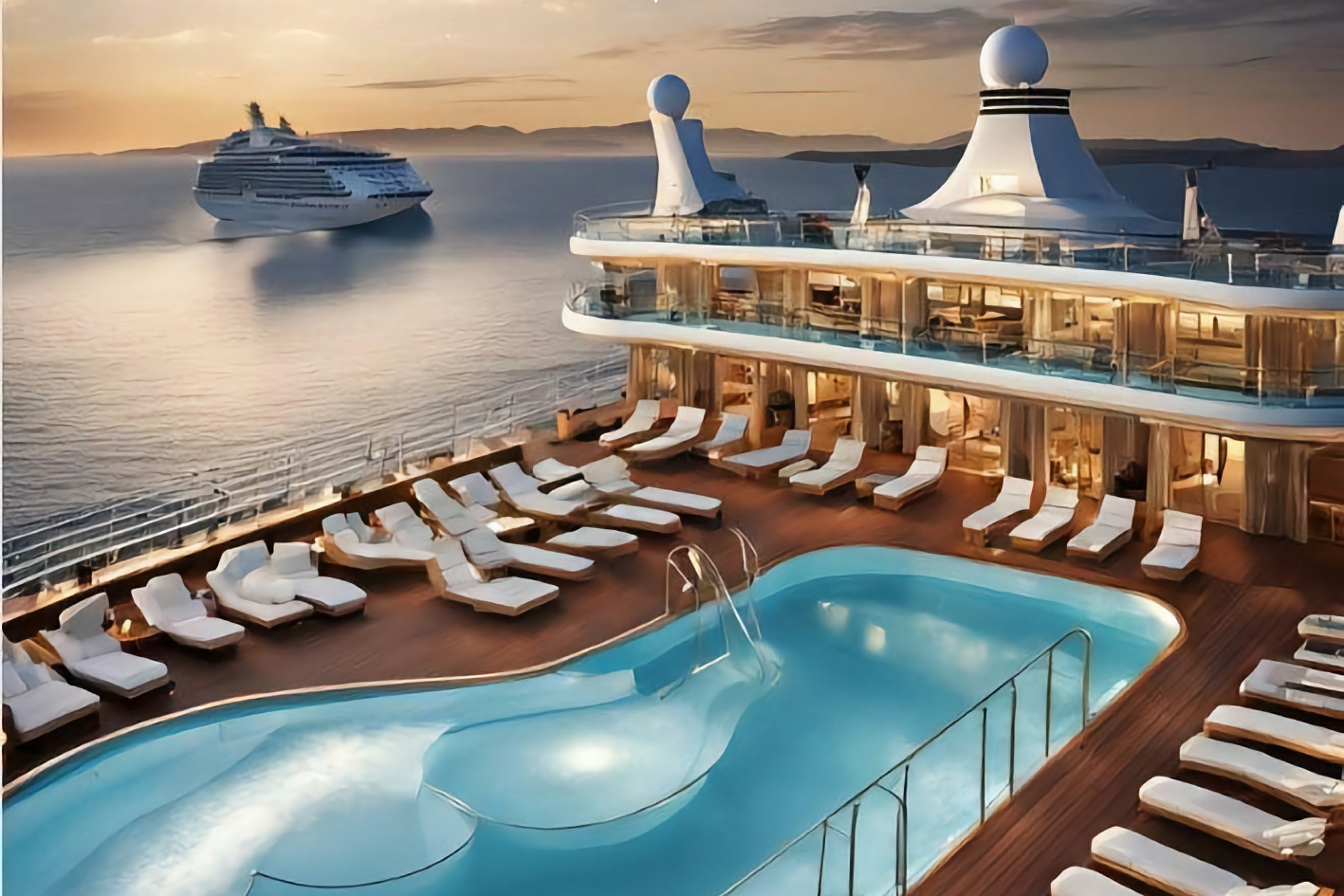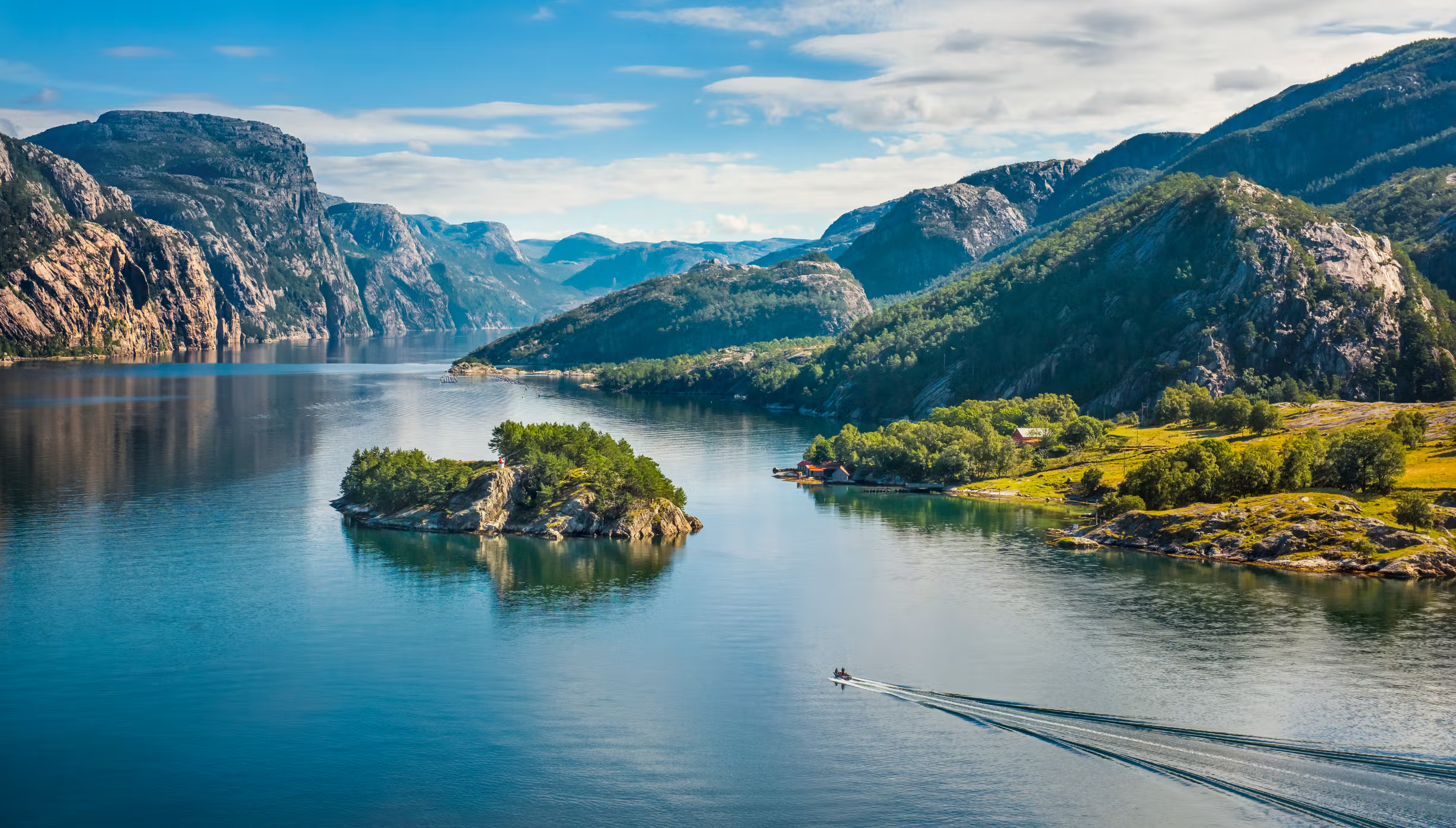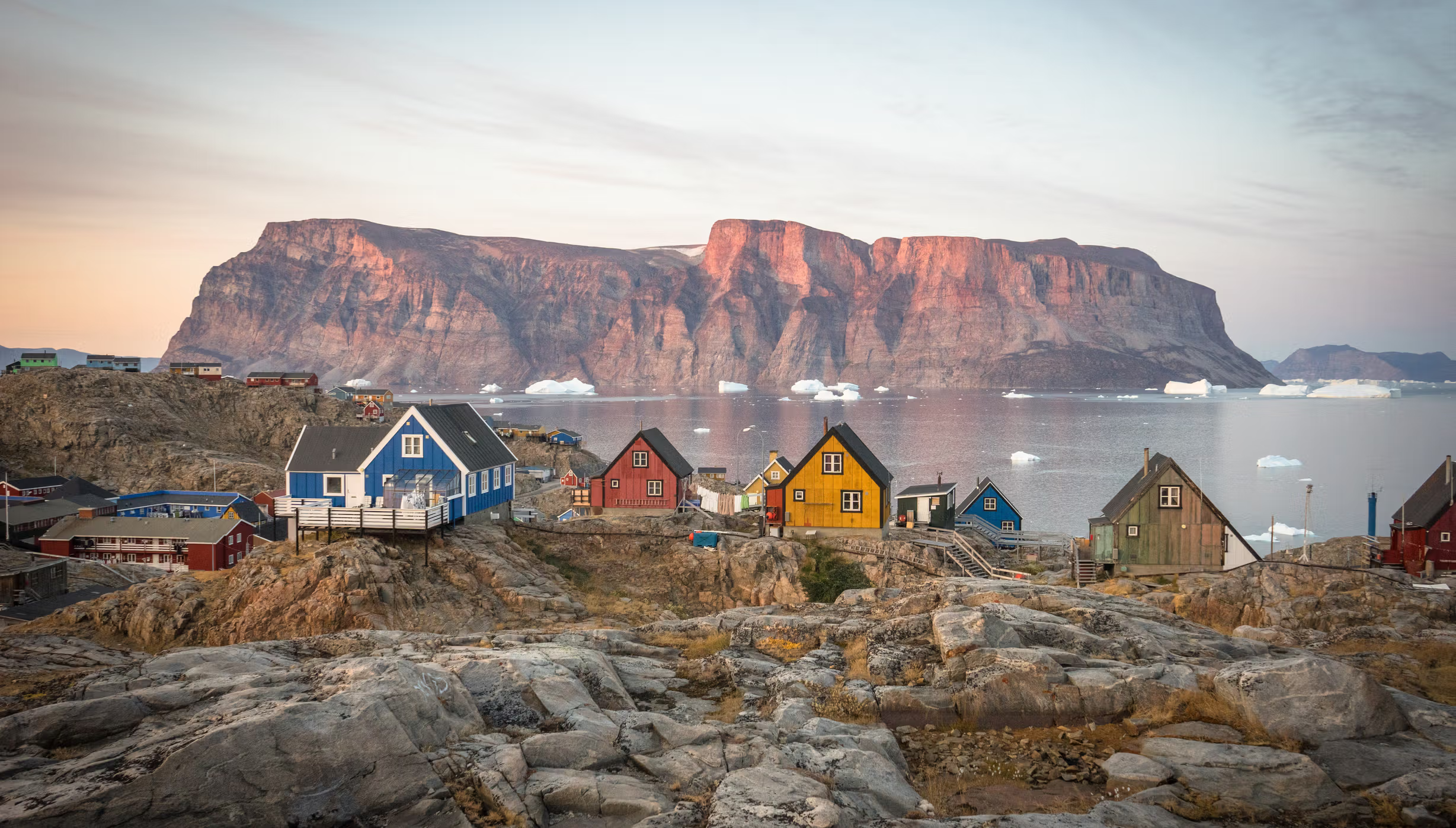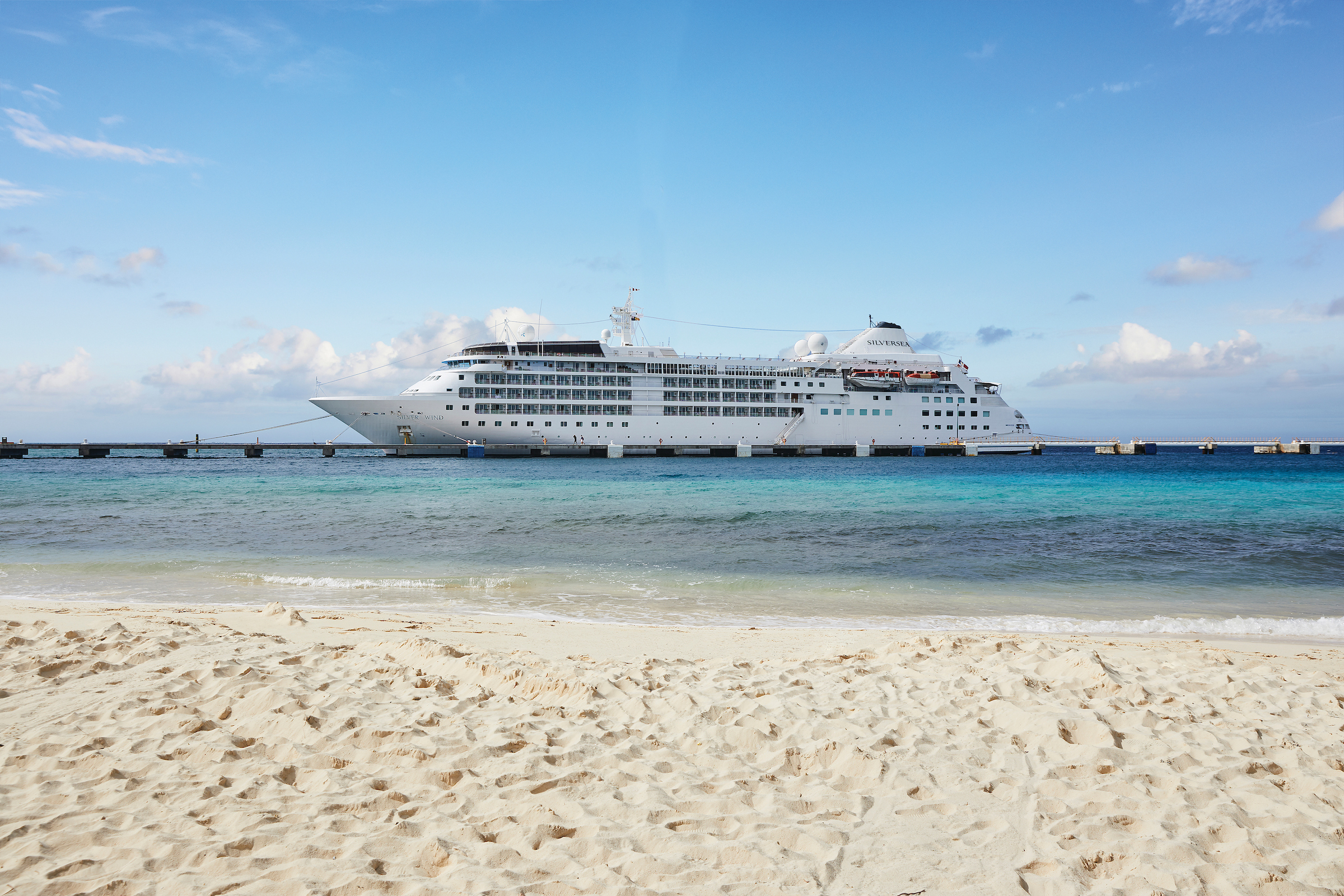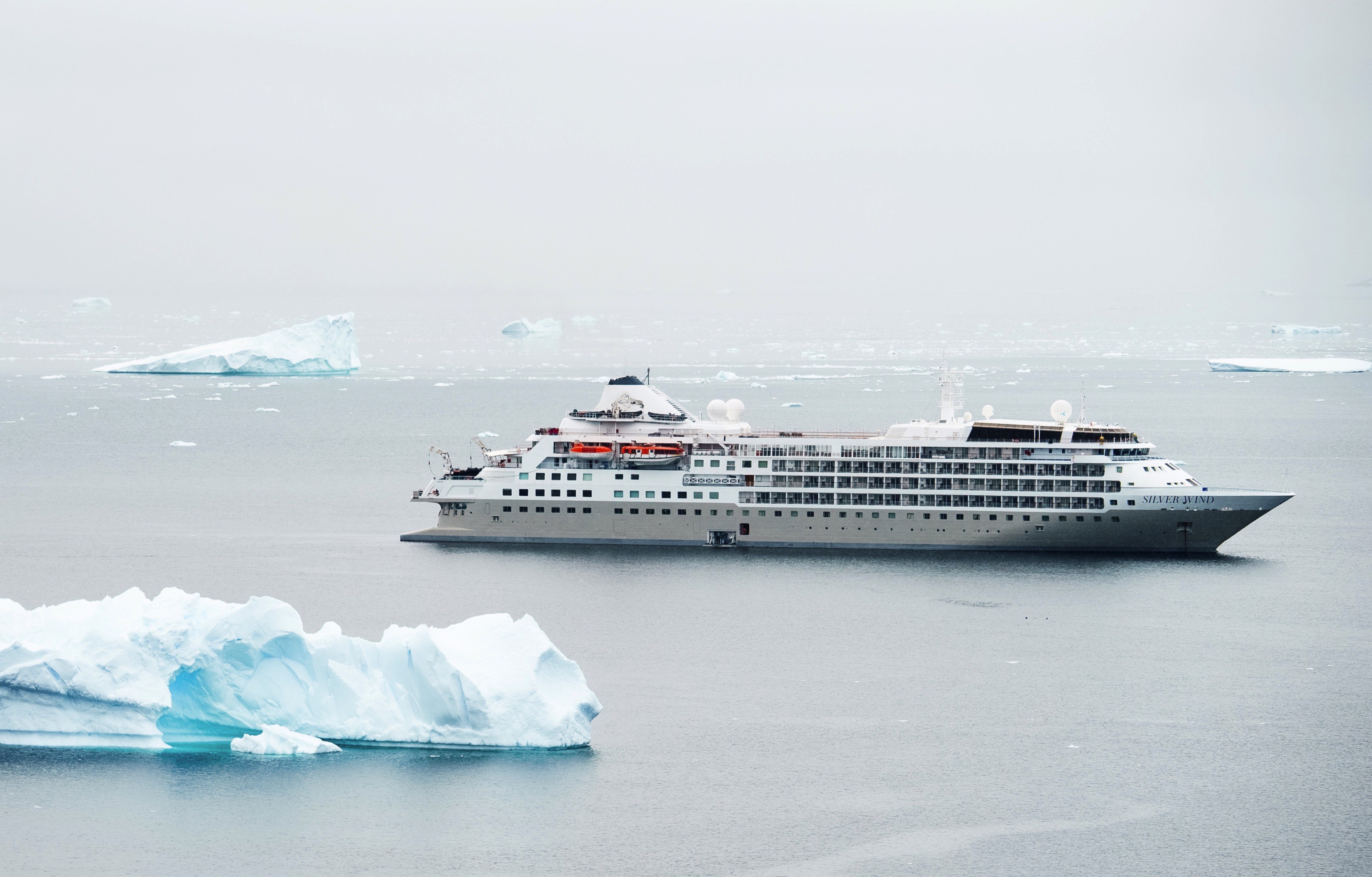Itinerary
Portsmouth is one of the most densely populated cities in Southern England, and is unusual as most of its built-up area occupies Portsea Island, linked to the mainland by road and rail bridges. Although there is a Roman fort at nearby Portchester, occupied later by the Saxons and Normans, there was no settlement on the site of Portsmouth at the time of the 1086 Domesday Book. The town developed in medieval times and received its first charter in 1194 from King Richard I; soon afterwards it became a major naval base. It has the world’s oldest dry dock, and is home to several famous ships, including HMS Victory, HMS Warrior and the Mary Rose, raised from the Solent in 1982. Portsmouth remains an important naval base and is home to a large proportion of the British service fleet. The waterfront area is now dominated by the Spinnaker Tower, 560 feet high, the United Kingdom’s tallest building outside London. Other things to see in the city include the house where Charles Dickens was born, and the City Museum, which contains a permanent exhibition devoted to another famous writer, Sir Arthur Conan Doyle, who lived in the town.
Day itinerary:
Portsmouth also known as Pompey, is home to three hugely important historic ships, HMS Victory, Nelson’s famous flagship at the battle of Trafalgar, HMS Warrior the first ironclad warship and the Mary Rose, Henry VIII’s warship that sank in the Solent just off of Southsea Castle. These are all housed at the Historic Dockyard, home of the Royal Navy and also home to the world’s first dry dock. The Historic Dockyard is one of the top ten visitor attractions in the UK. But Portsmouth is not just about history, the city is a cosmopolitan University city, with much to offer visitors and residents alike. Portsmouth has a Premier league football team, a superb seafront area, excellent shopping and a wide range of restaurants, pubs and bars. Portsmouth UK is home to the tallest publicly accessible structure in the UK, the Spinnaker Tower built right on the edge of Portsmouth Harbour at Gunwharf Quays. Portsmouth Harbour has been used in a number of films and television programmes such as Tomorrow Never Dies (James Bond), Oscar and Lucinda, Making Waves, Silent Witness, Mr Bean and Eastenders. The local area was used extensively in the filming of Tommy, The Who’s rock opera.
For many visitors Tresco is the most attractive of the Isles of Scilly. This is especially due to its Abbey Garden, which is home to thousands of exotic plant species from around 80 different countries. Plant collector Augustus Smith began the gardens in the 1830s on the site of an old Benedictine Abbey by channelling the weather up and over a network of walled enclosures built around the Priory ruins. He had three terraces carved from the rocky south slope and maximised Tresco’s mild Gulf Stream climate. Even in mid-winter there still are hundreds of plants flowering here. Another surprising attraction at the Abbey Garden is the collection of figureheads from ships that wrecked among the Isles of Scilly.
Day itinerary:
For many visitors Tresco is the most attractive of the Isles of Scilly. This is especially due to its Abbey Garden which is home to thousands of exotic plant species from around 80 different countries. Plant collector Augustus Smith began the gardens in the 1830s on the site of an old Benedictine Abbey by channelling the weather up and over a network of walled enclosures built around the Priory ruins. He had three terraces carved from the rocky south slope and maximised Tresco’s mild Gulf Stream climate. Even in mid-winter there still are hundreds of plants flowering here. Another surprising attraction at the Abbey Garden is the collection of figureheads from ships that wrecked among the Isles of Scilly.
St Mary’s is the Isle of Scilly’s largest island with a population of 1800 residents and an area of 6.58 square Kilometres; this is the gateway to the rest of the magnificent islands. Hugh town -a beautiful Old town with its own beach, nature reserve and church is the main attractions of St Mary’s, with tiny streets brimming with shops to pick up the perfect souvenir. St Mary’s is a hidden gem, with long stretches of white sandy beaches and a breath-taking untouched landscape. The coastline holds many archaeological sites along with miles of splendid walks along the coastal and country paths.
Day itinerary:
Scattered 30 miles offshore from England’s most south-westerly point – Land’s End – the Isles of Scilly are home to rich wildlife and green land sloping to powdery white beaches. The Isles of Scilly’s biggest island harbours around 1 600 people – roughly three-quarters of the total population – and is one of five occupied islands. Isolated and serene life here hums along at its own pace in this archipelago’s bubble which enjoys the UK’s mildest climate and some of its most spectacular beaches. Hugh Town is the centre of St Mary’s and you’ll be warmly welcomed by the incredibly tight-knit local community. A peaceful place watch out when the waters are suddenly parted by the competition of gig racing – the island’s sporting pride and joy – which sees teams competing in colourful rowboats. Elsewhere catch sight of Atlantic seals and seabirds like puffins and fulmars along nine miles of coastline. You can also spot the ghostly shipwrecks strewn around the island’s waters and the 140 islands and skerries that have made treacherous sailing historically. There’s a dense collection of historical sites that belies the islands’ small size – from a former prime minster’s grave to star-shaped fortresses. Tresco Abbey Garden is one of the UK’s most vibrant gardens with diverse plants bathing in the warmer climate and over 300 species on display. Taste the rewards of the mild weather with a glass of wine from England’s most south-westerly vineyard.
Day itinerary:
Vivid Kinsale offers a bright and breezy introduction to Ireland’s south coast, with colour-splashed buildings, and fascinating maritime history to unravel. The town swells in size during the summer months, when visitors from across Ireland head here to cast rods into the water, swing golf clubs, and sail the gentle waves of the postcard-perfect harbour. The twin fortresses, which watch out over the harbour’s entrance, hint at the town’s significant military past, and few clashes have been more important to Irish history than the Battle of Kinsale – which saw an Irish and Spanish assault on the English, back in 1601. The Irish were ultimately defeated, scuppering their bid for independence. If you look out over the waves, you can also see the location where a German U Boat sunk the RMS Lusitania –briefly the largest passenger ship ever built – during World War I. The attack led to the deaths of more than 1,100.
Kilronan is the principal town on the island of Inismore (Inis Mór) in the Aran Islands located in Galway Bay, and is one of them most picturesque spots in Ireland. Once for the sole purpose as a fishing port for the Aran fisherman, today it is the main port for the ferry companies and with its white sandy beach it has a wide selection of first class restaurants serving seafood, and traditional Irish bars, buskers, and accommodation it is a splendid spot to people watch and a base yourself before exploring the island. One of the island’s most famous attractions is Dun Aengus. Dun Aengus is a fort situated on the edge of a cliff at a height of 100 meters overlooking the Atlantic on the Aran Islands, Inishmore. It consists of a series of concentric circular walls, the innermost; the citadel encloses an area approximately 50 meters in diameter with 4m thick walls of stone. These walls have been rebuilt to a height of 6m and have wall walks, chambers, and flights of stairs as well. The main industries in Kilronan are fishing and tourism. School children also visit to improve their Irish at summer schools. Kilronan has a population of approx. 300 people.
Day itinerary:
If you have ever wanted to imbibe in the Celtic legends of your past, then Kilronan is the answer to your prayers. Situated on the isle of Inishmore in the Aran Islands in County Galway, Cill Rónáin – the official Gaelic spelling – is all about history, spirituality and the kind of rejuvenation that can only be found on Irish soil. The first thing you should know about the Aran Isles is that they are exceptionally beautiful. National Geographic called them “one of the world’s top island destinations” and they are universally recognised as being the “islands of saints and scholars”. Windswept moors and craggy cliffs akin to a Victorian novel flank rolling seas that are Dantesque in their raw power. This is where nature comes home to roost (not to mention the 60,000 seabirds that call the islands their home). Inishmore (Inis Mor) is the biggest island of the archipelago, and as such has the most interesting Celtic history. Over 50 Celtic, Christian and pre-Christian sites are on Inishmore alone (with others on the other two islands that make up the rest of the archipelago). The most important of these site is perhaps the prehistoric fort of Dún Aonghasa, “the most magnificent barbaric monument extant in Europe”. Perched precariously on a 100-metre-high cliff, the fort dates back 3,000 years and is one of Ireland’s most ancient and sacred sites. Little is known of the history of Dún Aonghasa, not who Dún Aonghasa may have been, but a placing so close to the sea edge suggests ritualistic significance.
Day itinerary:
“They go to the cliffs of Moher rising out of the mist” … these words, written by great American poet Wallace Stevens, immortalised the cliffs of Moher in the best way imaginable. Romantic, wild, mysterious and beautiful, the cliffs of Moher are to Ireland what poetry is to prose. Located at the south western edge of: County Clare, the 300-million-year-old cliffs stretch for 14 km. They are by far the country’s most visited landmark, welcoming an astonishing 1.5 million visitors annually. The vistas are exceptional, and understandably the pride of Ireland. On a good day you can see for miles: all the way to the Aran Islands, Galway Bay, the caves, O’Brien’s tower and of course the many miles of cliffs themselves. Birdwatchers will be doubly blessed, as Moher is designated as a UNESCO Geo Park and enjoys a Special Protection status. Get your binoculars at the ready as the cliffs are filled with thousands of Guillemots, Razorbills, Fulmars and Kittiwakes, as well as the largest mainland colony of Puffins. The beautiful cliffs are rich with history and legend. Two theories surround why Irish Politician Sir Cornelius O’Brien commissioned his eponymous tower in 1835. The most common belief is that so he (and others) could benefit from the stunning views the cliffs have to offer. The more salacious believe that the tower was a place away from prying eyes for O’Brien to bring his lady friends! Whatever the reason, today the viewing platform on the roof still offers one of the best coastal views there is.
St Kilda is a remarkable uninhabited archipelago some 40 nautical miles beyond the Outer Hebrides. The stunning cliffs and sea stacks are home to the most important seabird breeding colony in northwest Europe. St Kilda is one of the few places in the world to have received dual World Heritage status from UNESCO in recognition of its Natural Heritage and cultural significance. Village Bay on the island of Hirta once supported a population of over 200, but the last islanders left in the 1930s. Recent restoration work on the village by the National Trust for Scotland offers a marvellous link with the past. One of the caretakers acts as shopkeeper and postmaster for any visitors who might like to send a postcard home from St. Kilda.
Day itinerary:
Gloriously remote, St. Kilda is an archipelago 50 miles off the Isle of Harris. Although the four islands are uninhabited by humans, thousands of seas birds call these craggy cliffs home, clinging to the sheer faces as if by magic. Not only is St. Kilda home to the UK’s largest colony of Atlantic Puffin (almost 1 million), but also the world largest colony Gannets nests on Boreray island and its sea stacks. The islands also home decedents of the world’s original Soay sheep as well as having a breed of eponymously named mice. The extremely rare St. Kilda wren unsurprisingly hails from St. Kilda, so birders should visit with notebook, binoculars and camera to hand. While endemic animal species is rife on the island, St. Kilda has not been peopled since 1930 after the last inhabitants voted that human life was unsustainable. However, permanent habitation had been possible in the Medieval Ages, and a vast National Trust for Scotland project to restore the dwellings is currently being undertaken. The islands even enjoyed a status as being an ideal holiday destination in the 19th century. Today, the only humans living on the islands are passionate history, science and conservation scholars. One of the caretakers even acts as shopkeeper and postmaster for any visitors who might like to send a postcard home from St. Kilda. It should be noted that St. Kilda is the UKs only (and just one of 39 in the world) dual World Heritage status from UNESCO in recognition of its Natural Heritage and cultural significance.
Day itinerary:
As an isolated island of the remote St Kilda Group, Boreray island is one of the most far flung and weather impacted islands of the North East Atlantic. Imagine trying to live here during stormy weather. Landing requires jumping or swimming ashore; and yet the island has been lived on or visited from Neolithic times. Collecting seabirds and their eggs, and storing them for winter, may have been even more important than raising sheep. Boreray Sheep are the rarest breed of sheep in Britain. They evolved from short-tailed sheep brought from the Scottish mainland but have been isolated long enough to have evolved into a distinctive small and horned breed. Only found on Boreray Island, they remained as a wild flock when the last people left the St Kilda Islands in 1930. The Souy are a separate and different breed of sheep found on the other St Kilda Islands. Look out for the Boreray Sheep grazing on the slopes of hilly Boreray Island. Seabirds thrive on Boreray and its two attendant rocks stacks, raising new chicks each summer. Northern Gannets glide overhead as they attempt difficult landings at nest sites. Seeing gannets plunge from a great height into the sea is an exciting way to understand the effort required to feed themselves and chicks. Northern Fulmers nest on the volcanic rock cliffs and Atlantic Puffins fly in and out of burrow-strewn slopes. Boreray is part of the St Kilda World Heritage Site, a rare example of a site recognised for both its outstanding natural and cultural values.
Day itinerary:
Cliffs of tall hexagonal columns create a sensational landscape at the Shiant Islands, especially when viewed from the sea. The cliffs of six-sided rock columns look like the cross-section of an enormous honeycomb. The rock formations were formed when molten volcanic magma cooled very slowly underground. Millions of years of erosion has exposed the six-sided columns to the sea, and to us. The tallest of these formations is 120 metres (390 feet) high. During spring and summer, flights of seabirds near the Shiant Islands catch the eye. Many long-winged seabirds wheel and soar gracefully. Others are more shaped for underwater swimming and fly in direct lines, beating stubby wings to resemble flying potatoes. Some birds nest in burrows while others, like Black-legged Kittiwakes, nest on cliffs. Rather than build nests, guillemots lay eggs on bare rock ledges. The pointed shape of the eggs ensures they roll in a tight circle, not off the ledge to the sea below. The Shiant Islands are part of the Outer Hebrides and located between the Isles of Lewis and Skye. Historically, they have supported families of sheep grazers who could tolerate a lonely island outpost. The Shiants were known as the last place in Britain where the Black Rat occurred in substantial numbers. Originally introduced to Britain from Asia in Roman times these rodents caused problems, eating eggs and chicks of seabirds. A successful eradication program eliminated the rats in 2016, giving the seabird colonies well-earned peace.
Day itinerary:
Skye epitomizes Scotland’s wild celtic appeal. A turbulent geological history has given this beautiful, rugged island some of Britain’s most varied and dramatic scenery. Steeped in mystery, romance and adventure, the Isle of Skye is perhaps the most well-known of Scotland’s many islands. Charles Edward Stuart, better known as Bonnie Prince Charlie, escaped here from the mainland disguised as a maidservant of a woman by the name of Flora MacDonald. The north of the island is dominated by a rugged volcanic plateau, the south by the Cuillins mountain range, whose peaks were sculpted by the glaciers of the Ice Age. Skye is divided by numerous sea lochs allowing continuous proximity to the sea. The limestone grasslands of the south are the home of sheep and cattle. Scattered about are ruins of crofts, small holdings used for grazing; they were abandoned as their owners fell into poverty due to lack of income. Dunvegan is situated in a sheltered sea loch, or fjord, on the northwestern coast of the island on the Waternish peninsula. The small settlement is dominated by Dunvegan Castle. The oldest inhabited castle in Scotland, it has been the seat of the chiefs of the Clan MacLeod for the past 700 years. The castle offers insights into Scotland’s clan spirit with paintings and relics from the MacLeod Clan. The castle gardens were originally laid out in the 18th century and are of considerable interest with the woodland glades, shimmering pools and a multitude of rhododendrons. Loch Dunvegan is home to a seal colony; the two main varieties are the brown seal and the great gray Atlantic seal. Small local boats depart from the jetty at frequent intervals throughout the day enabling close observation of these playful sea mammals.
With a population of 120 residents, Iona is Located off the Southwest of Mull. The island is 3 miles long and 1.5 miles wide but draws in thousands of visitors each year due to its natural beauty and historical interest. Saint Columba and his fellow monks landed here in 563. This beautiful stretch of coastline brings out the true beauty of Iona facing onto the Gulf Stream that gives the island its mild climate. Located to the south of the road lies Sìthean Mòr (Large fairy hill) and alternatively known as the Hill of Angels, this is said to have been the setting for many rituals and traditions dating far back in history. This wonderful highlight, Iona Abbey was founded by Saint Columba in 563 and is said to have survived many Viking attacks. Although little remains of the monastic buildings of this period, the magnificent Abbey is the main attraction.
Day itinerary:
If tiny islands that resonate with peace and tranquillity are your idea of travel heaven, then welcome to Iona. Almost 200 miles east of Edinburgh, set in Scotland’s Inner Hebrides, this magical island has a spiritual reputation that precedes it. And luckily, more than lives up to. The island is miniscule. Just three miles long and only one and a half miles wide, this is not a place that hums with urban attractions. 120 people call Iona home (this number rises significantly if the gull, tern and Kittiwake population is added), although residential numbers do go up (to a whopping 175) in summer. The beautiful coastline is lapped by the gulf stream and gives the island a warm climate with sandy beaches that look more Mediterranean than Scottish! Add to that a green field landscape that is just beautiful, and you’ll find that Iona is a place that stays with you long after you leave. Iona’s main attraction is of course its abbey. Built in 563 by Saint Columbia and his monks, the abbey is the reason why Iona is called the cradle of Christianity. Not only is the abbey (today an ecumenical church) one of the best – if not the best – example of ecclesiastical architecture dating from the Middle Ages, but it also serves as an important site of spiritual pilgrimage. St. Martin’s Cross, a 9th century Celtic cross that stands outside the abbey, is considered as the finest example of Celtic crosses in the British Isles. Rèilig Odhrain, or the cemetery, allegedly contains the remains of many Scottish kings.
The stunning Isle of Lunga is the largest island in the Treshnish archipelago. With volcanic origin the isle was populated until the 19th Century, and remains of black houses can be seen around this magnificent coastal jewel. Abundant plant life and exotic birdlife are now the main inhabitants of the area. Fortunate visitors view the magnificent array of birds, especially the great puffins that breed on the islands plateau. One can sit within just a few feet away without disturbing the avian ambassador’s peace. The 81 hectare island is home to many rare and endangered plants such as, primroses and orchids. Views over the landscape and across the ocean can be seen from the 300 foot high cliffs.
Day itinerary:
The stunning Isle of Lunga is the largest island in the Treshnish archipelago. With volcanic origin the isle was populated until the 19th Century and remains of black houses can be seen around this magnificent coastal jewel. Abundant plant life and exotic birdlife are now the main inhabitants of the area. Fortunate visitors view the magnificent array of birds especially the great puffins that breed on the islands plateau. One can sit within just a few feet away without disturbing the avian ambassador’s peace. The 81 hectare island is home to many rare and endangered plants such as primroses and orchids. Views over the landscape and across the ocean can be seen from the 300 foot high cliffs.
Before English and Scottish settlers arrived in the 1600s, Belfast was a tiny village called Béal Feirste (“sandbank ford”) belonging to Ulster’s ancient O’Neill clan. With the advent of the Plantation period (when settlers arrived in the 1600s), Sir Arthur Chichester, from Devon in southwestern England, received the city from the English Crown, and his son was made Earl of Donegall. Huguenots fleeing persecution from France settled near here, bringing their valuable linen-work skills. In the 18th century, Belfast underwent a phenomenal expansion—its population doubled every 10 years, despite an ever-present sectarian divide. Although the Anglican gentry despised the Presbyterian artisans—who, in turn, distrusted the native Catholics—Belfast’s growth continued at a dizzying speed. The city was a great Victorian success story, an industrial boomtown whose prosperity was built on trade, especially linen and shipbuilding. Famously (or infamously), the Titanic was built here, giving Belfast, for a time, the nickname “Titanic Town.” Having laid the foundation stone of the city’s university in 1845, Queen Victoria returned to Belfast in 1849 (she is recalled in the names of buildings, streets, bars, monuments, and other places around the city), and in the same year, the university opened under the name Queen’s College. Nearly 40 years later, in 1888, Victoria granted Belfast its city charter. Today its population is nearly 300,000, tourist numbers have increased, and this dramatically transformed city is enjoying an unparalleled renaissance.This is all a welcome change from the period when news about Belfast meant reports about “the Troubles.” Since the 1994 ceasefire, Northern Ireland’s capital city has benefited from major hotel investment, gentrified quaysides (or strands), a sophisticated new performing arts center, and major initiatives to boost tourism. Although the 1996 bombing of offices at Canary Wharf in London disrupted the 1994 peace agreement, the ceasefire was officially reestablished on July 20, 1997, and this embattled city began its quest for a newfound identity.Since 2008, the city has restored all its major public buildings such as museums, churches, theaters, City Hall, Ulster Hall—and even the glorious Crown Bar—spending millions of pounds on its built heritage. A gaol that at the height of the Troubles held some of the most notorious murderers involved in paramilitary violence is now a major visitor attraction.Belfast’s city center is made up of three roughly contiguous areas that are easy to navigate on foot. From the south end to the north, it’s about an hour’s leisurely walk.
Day itinerary:
Reborn as a cool modern city Belfast has successfully left its troubles behind emerging as a hotbed of culture and architecture where the comfort of a cosy pub is never far away. A walk across the Lagan Weir Footbridge brings you to Belfast’s fascinating Titanic District – an area of the city devoted to its rich ship-building heritage. The state-of-the-art Titanic Museum brings the story of the doomed vessel to life and is the largest museum dedicated to the infamously ‘unsinkable’ ship. There’s just enough time to give the 10-metre long Salmon of Knowledge sculpture a quick peck for luck before continuing to explore. A stark barbed wire and graffitied sheet metal barrier marks an abrupt scar through the city’s residential areas. The Peace Line was constructed during the height of the Troubles when Belfast was plagued by sectarian divisions between Protestants and Catholics. Nowadays you can jump in a black taxi tour to see the colourful murals and living history of the walls which stand as a stark reminder of the fragility of peace. After exploring the city’s historic divisions a reminder of Belfast’s uniting creativity can be found at the Metropolitan Arts Centre – a seven-storey tall building which invites light to gloriously cascade inside. The Cathedral Quarter is a cobbled blend of flower-adorned pubs restaurants and theatres and venues where music spills out onto the streets at night and many a pint is cheerily shared.
Dublin is making a comeback. The decade-long “Celtic Tiger” boom era was quickly followed by the Great Recession, but The Recovery has finally taken a precarious hold. For visitors, this newer and wiser Dublin has become one of western Europe’s most popular and delightful urban destinations. Whether or not you’re out to enjoy the old or new Dublin, you’ll find it a colossally entertaining city, all the more astonishing considering its intimate size.It is ironic and telling that James Joyce chose Dublin as the setting for his famous Ulysses, Dubliners, and A Portrait of the Artist as a Young Man because it was a “center of paralysis” where nothing much ever changed. Which only proves that even the greats get it wrong sometimes. Indeed, if Joyce were to return to his once-genteel hometown today—disappointed with the city’s provincial outlook, he left it in 1902 at the age of 20—and take a quasi-Homeric odyssey through the city (as he so famously does in Ulysses), would he even recognize Dublin as his “Dear Dirty Dumpling, foostherfather of fingalls and dotthergills”?For instance, what would he make of Temple Bar—the city’s erstwhile down-at-the-heels neighborhood, now crammed with cafés and trendy hotels and suffused with a nonstop, international-party atmosphere? Or the simple sophistication of the open-air restaurants of the tiny Italian Quarter (named Quartier Bloom after his own creation), complete with sultry tango lessons? Or of the hot–cool Irishness, where every aspect of Celtic culture results in sold-out theaters, from Once, the cult indie movie and Broadway hit, to Riverdance, the old Irish mass-jig recast as a Las Vegas extravaganza? Plus, the resurrected Joyce might be stirred by the songs of Hozier, fired up by the sultry acting of Michael Fassbender, and moved by the award-winning novels of Colum McCann. As for Ireland’s capital, it’s packed with elegant shops and hotels, theaters, galleries, coffeehouses, and a stunning variety of new, creative little restaurants can be found on almost every street in Dublin, transforming the provincial city that suffocated Joyce into a place almost as cosmopolitan as the Paris to which he fled. And the locals are a hell of a lot more fun! Now that the economy has finally turned a corner, Dublin citizens can cast a cool eye over the last 20 crazy years. Some argue that the boomtown transformation of their heretofore-tranquil city has permanently affected its spirit and character. These skeptics (skepticism long being a favorite pastime in the capital city) await the outcome of “Dublin: The Sequel,” and their greatest fear is the possibility that the tattered old lady on the Liffey has become a little less unique, a little more like everywhere else.Oh ye of little faith: the rare ole gem that is Dublin is far from buried. The fundamentals—the Georgian elegance of Merrion Square, the Norman drama of Christ Church Cathedral, the foamy pint at an atmospheric pub—are still on hand to gratify. Most of all, there are the locals themselves: the nod and grin when you catch their eye on the street, the eagerness to hear half your life story before they tell you all of theirs, and their paradoxically dark but warm sense of humor. It’s expected that 2016 will be an extra-special year in the capital, as centenary celebrations of the fateful 1916 Easter Rising will dominate much of the cultural calendar.
Day itinerary:
Atmospheric cobbled streets with buskers scraping fiddles and characterful pubs inviting passersby inside is Dublin in a snapshot. Horse-drawn carriages plod along cobbled centuries-old streets blending with an easy-going cosmopolitan outlook. Known for its fun-filled gathering of pubs any excuse works to enjoy a celebratory toast and chat among good company. Home to perhaps the world’s most famous beer – slurp perfect pourings of thick dark Guinness – cranked out for the city’s thirsty punters. Learn more of the humble pint’s journey at the Guinness Storehouse. Dublin has come along way since the Vikings established a trading port here back in the 9th Century. In the time since the city became the British Empire’s defacto second city and the Georgian imprint still adds oodles of historic character. Learn of 1916’s Easter Uprising when the Irish rebelled and established their independence here as you visit the infamous haunting Kilmainham Gaol. The uprising’s leaders were tried and executed in these dark confines. Dublin’s St. Patrick’s Cathedral has immense history below its steep spire which dates back to 1191. There’s rich literary heritage to leaf through too and the city’s streets were rendered vividly in James Joyce’s classic Ullyses. The Museum of Literature celebrates the full scope of Dublin’s lyrical talents. Trinity College also has a prestigious roll-call of alumni – visit to see the Book of Kells a beautifully illustrated bible of the medieval era.
Ship features

Owner's Suite
The name says it all. A stylish apartment. Prestigious and classic. For those who seek the superlative level of space, comfort and service on board. The Owner’s Suite is available as a one-bedroom configuration or as two bedrooms (as illustrated) by adjoining with a Vista Suite so you can enjoy your luxury cruise in style.
One bedroom: 55 sq.m. including veranda
Two bedroom: 77 sq.m. including veranda
Images and suite plans are intended as a general reference. Features, materials, finishes and layout maybe different than shown.
Please note that the 3rd guest will sleep on a comfortable sofa bed in the reception area of the suite.
Essentials
- Deck(s): 7
- Section: Mid-Ship
Characteristics
- Veranda
- Separate dining area
- Living room with sitting area
- Standard vanity
- Walk-in shower
- Whirlpool bath
- Walk-in wardrobe with personal safe
Furniture
- Queen size bed
- Writing desk
- Vanity table
- Luxury bed mattresses
Media & Communication
- Unlimited Premium Wi-Fi
- 2 large flat screen TVs with Interactive Media Library
- Sound system with bluetooth connectivity
- Direct dial telephone
- Wall mounted USB-C mobile device chargers
- Dual voltage 110/220 outlets
Onboard Services
- Butler service
- Complimentary laundry, pressing & wet cleaning
- Daily canapé service, Welcome chocolate, Welcome fruit stand
- Dinner for two in La Dame, one evening per voyage,
- Two hours of worldwide phone use, per voyage segment
- Champagne on arrival
Amenities
- Espresso machine
- Pillow menu
- Refrigerator and bar setup stocked with your preferences
- Plush bathrobe
- Luxury bath amenities
- Umbrella
- Hair Dryer
- Slippers
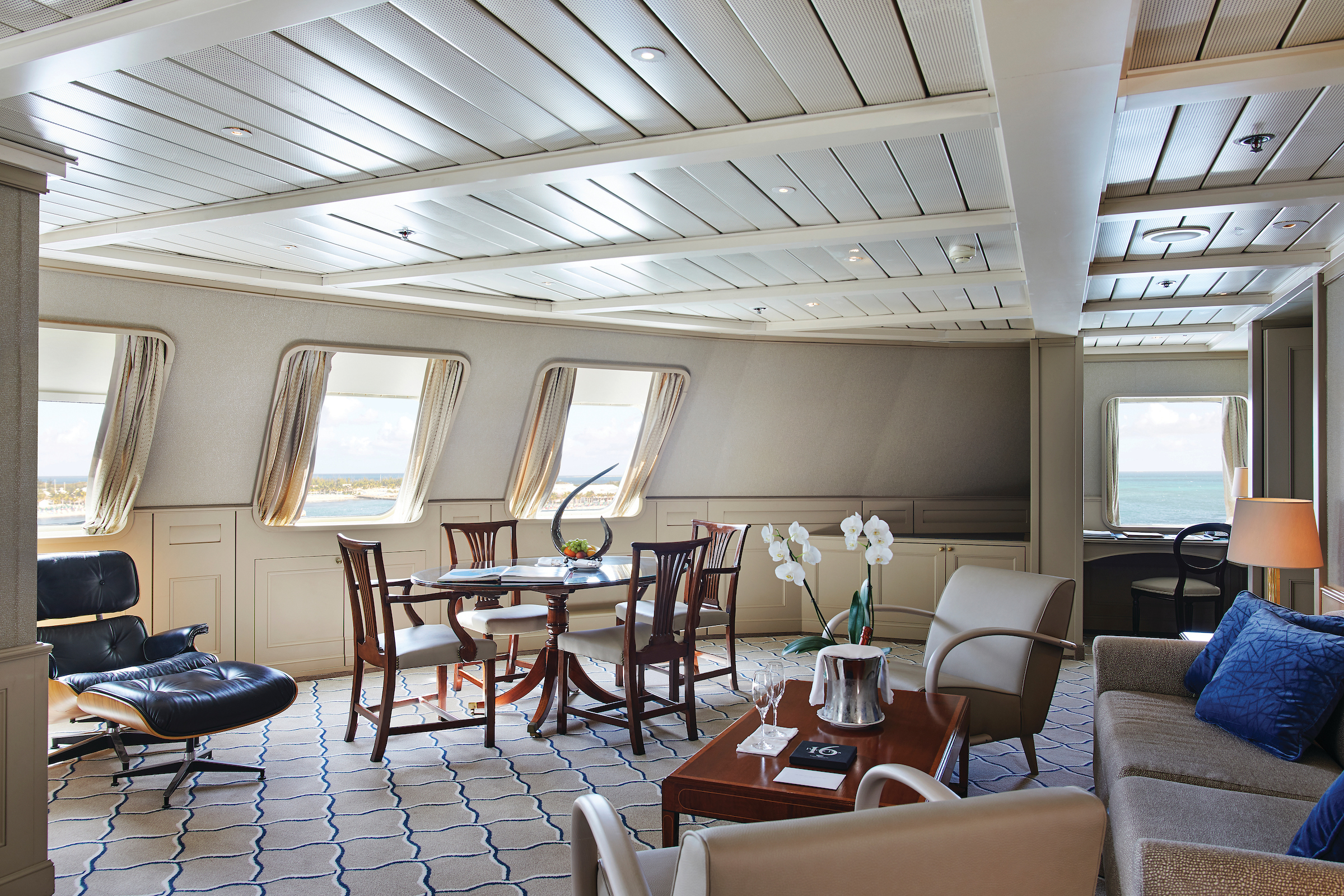
Grand Suite
Expertly designed and exquisitely appointed. The Grand Suite on the Silver Wind ideal for entertaining friends or enjoying a quiet dinner “at home”. Available as a one-bedroom configuration or as two bedroom by adjoining with a Veranda Suite.
One bedroom: 95 sq.m. including veranda
Two bedroom: 122 sq.m. including veranda
Images and suite plans are intended as a general reference. Features, materials, finishes and layout maybe different than shown.
Please note that the 3rd guest will sleep on a comfortable sofa bed in the reception area of the suite.
Essentials
- Deck(s): 7
- Section: Forward
Characteristics
- Veranda
- Separate dining area
- Living room with sitting area
- Standard vanity
- Walk-in shower
- Whirlpool bath
- Walk-in wardrobe with personal safe
Furniture
- Queen size bed
- Writing desk
- Vanity table
- Luxury bed mattresses
Media & Communication
- Unlimited Premium Wi-Fi
- 2 large flat screen TVs with Interactive Media Library
- Sound system with bluetooth connectivity
- Direct dial telephone
- Wall mounted USB-C mobile device chargers
- Dual voltage 110/220 outlets
Onboard Services
- Butler service
- Complimentary laundry, pressing & wet cleaning
- Daily canape service, Welcome chocolate, Welcome fruit stand
- Dinner for two in La Dame, one evening per voyage,
- Two hours of worldwide phone use, per voyage segment
- Champagne on arrival
Amenities
- Espresso machine
- Pillow menu
- Refrigerator and bar setup stocked with your preferences
- Plush bathrobe
- Luxury bath amenities
- Umbrella
- Hair Dryer
- Slippers

Royal Suite
Stately. Commanding and majestic. Perfect for entertaining. The Royal suite lives up to its name. Enough living space to roam. The pinnacle of good living. Available as a one-bedroom configuration or as two bedroom by adjoining with a Veranda Suite.
One bedroom: 69 sq.m. including veranda
Two bedroom: 96 sq.m. including veranda
Images and suite plans are intended as a general reference. Features, materials, finishes and layout maybe different than shown.
Please note that the 3rd guest will sleep on a comfortable sofa bed in the reception area of the suite.
Essentials
- Deck(s): 6
- Section: Forward
Characteristics
- Veranda
- Separate dining area
- Living room with sitting area
- Standard vanity
- Walk-in shower
- Whirlpool bath
- Walk-in wardrobe with personal safe
Furniture
- Queen size bed
- Writing desk
- Vanity table
- Luxury bed mattresses
Media & Communication
- Unlimited Premium Wi-Fi
- 2 large flat screen TVs with Interactive Media Library
- Sound system with bluetooth connectivity
- Direct dial telephone
- Wall mounted USB-C mobile device chargers
- Dual voltage 110/220 outlets
Onboard Services
- Butler service
- Complimentary laundry, pressing & wet cleaning
- Daily canape service, Welcome chocolate, Welcome fruit stand
- Dinner for two in La Dame, one evening per voyage,
- Two hours of worldwide phone use, per voyage segment
- Champagne on arrival
Amenities
- Espresso machine
- Pillow menu
- Refrigerator and bar setup stocked with your preferences
- Plush bathrobe
- Luxury bath amenities
- Umbrella
- Hair Dryer
- Slippers
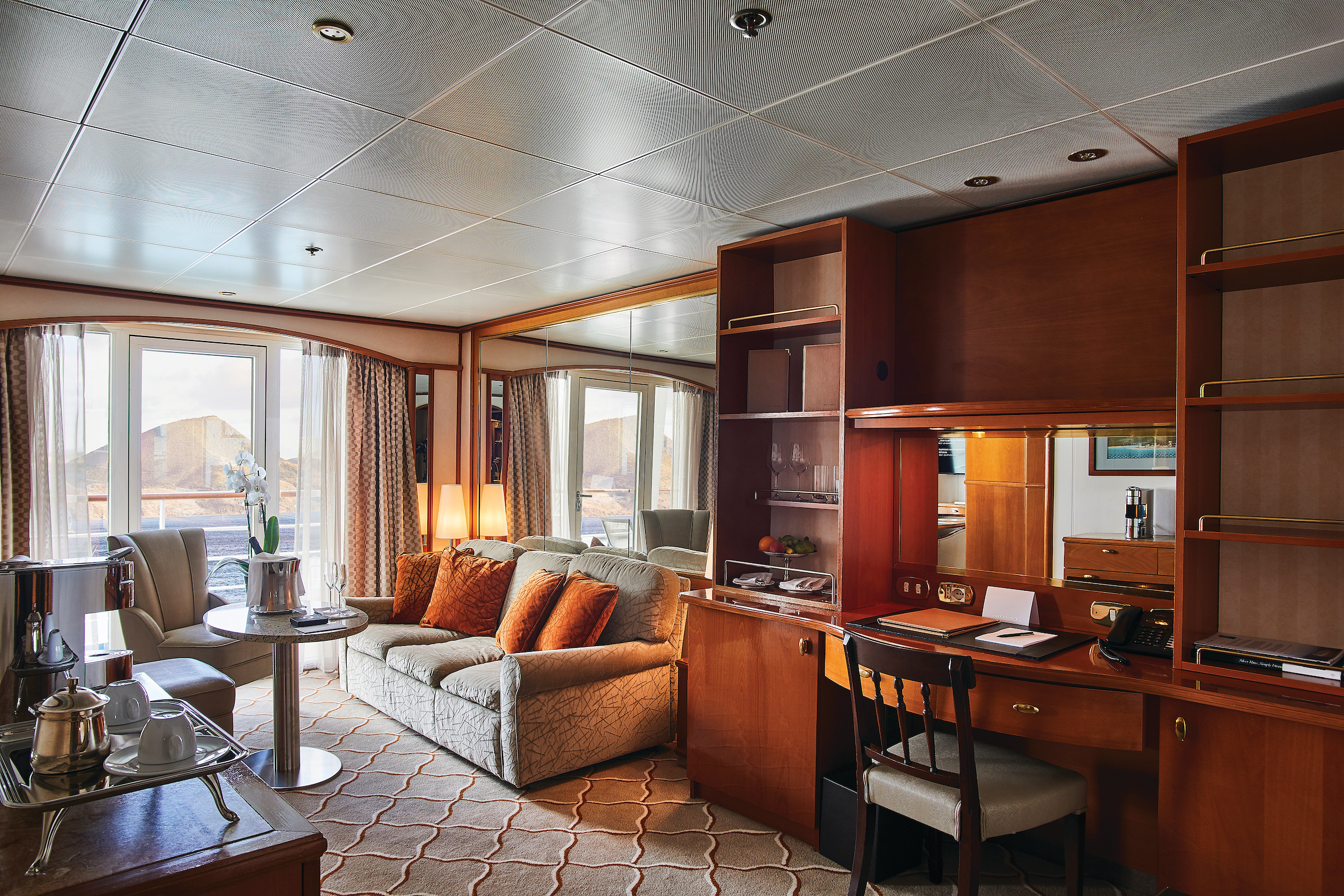
Silver Suite
Stylish and sophisticated. Larger verandas. Perfection in design for comfortable living.
For those wanting more space, Silver Suites are ideal. Stylish and sophisticated. Separate dining and living rooms. Larger verandas. Situated midship on the Silver Wind. Perfection in design for comfortable living. Silver Suites accommodate three guests.
One bedroom: 48 sq.m. including veranda
Images and suite plans are intended as a general reference. Features, materials, finishes and layout maybe different than shown.
Please note that the 3rd guest will sleep on a comfortable sofa bed in the reception area of the suite.
Essentials
- Deck(s): 5, 6, 7
- Section: Mid-Ship
Characteristics
- Veranda
- Separate dining area
- Living room with sitting area
- Standard vanity
- Full-size bath
- Walk-in wardrobe with personal safe
Furniture
- Queen size bed
- Writing desk
- Vanity table
- Luxury bed mattresses
Media & Communication
- Unlimited Premium Wi-Fi
- 2 large flat screen TVs with Interactive Media Library
- Sound system with bluetooth connectivity
- Direct dial telephone
- Wall mounted USB-C mobile device chargers
- Dual voltage 110/220 outlets
Onboard Services
- Butler service
- Complimentary laundry, pressing & wet cleaning
- Daily canape service, Welcome chocolate, Welcome fruit stand
- Champagne on arrival
Amenities
- Espresso machine
- Pillow menu
- Refrigerator and bar setup stocked with your preferences
- Plush bathrobe
- Luxury bath amenities
- Umbrella
- Hair Dryer
- Slippers
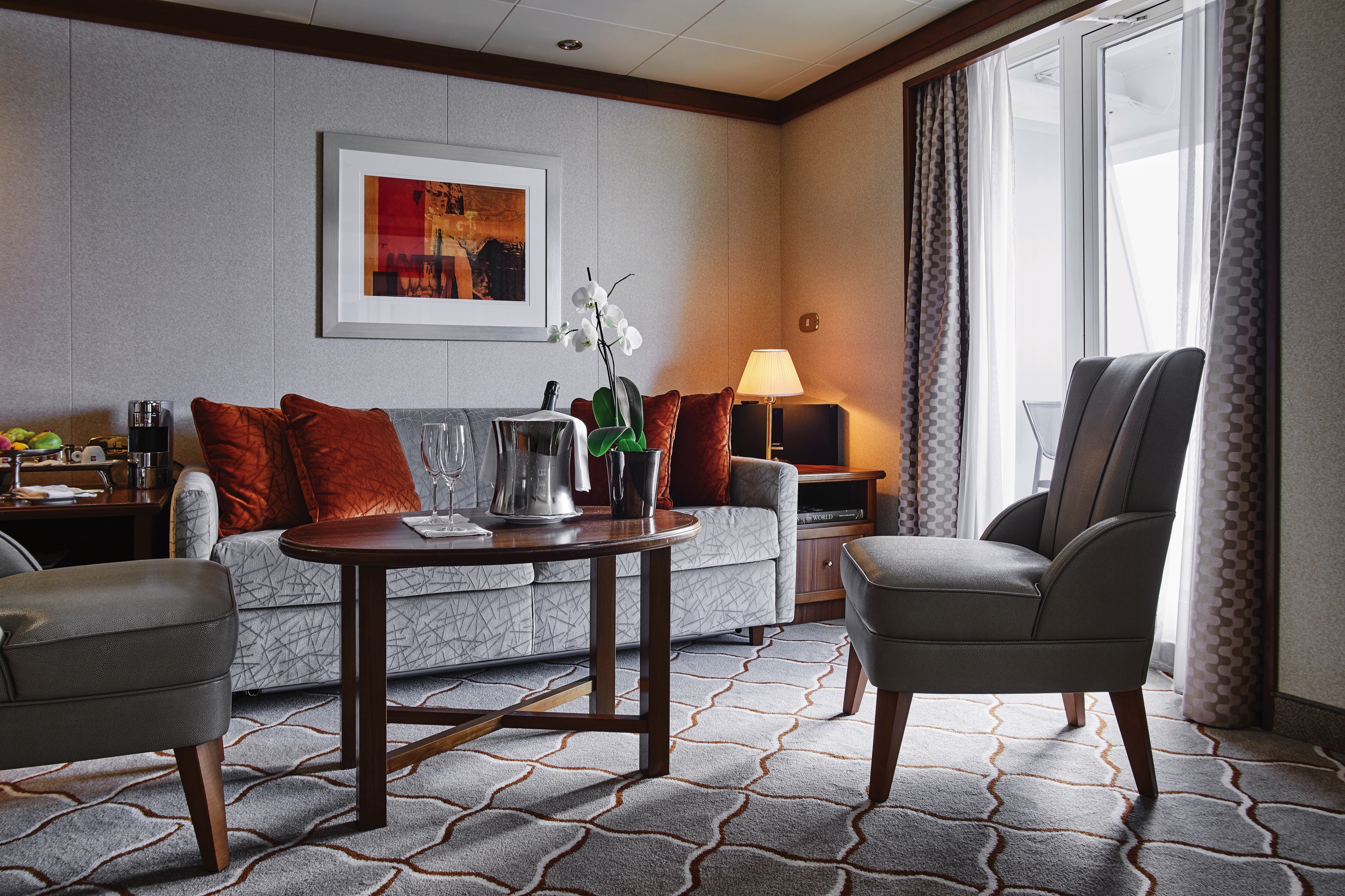
Medallion Suite
Teak-style balcony with floor-to-ceiling glass doors. Relaxing living room space with seating area.
A mark of distinction. Sumptuous. Spacious. Rich textures and panoramic views surround you with distinguished luxury. The perfect summary of The Medallion Suite offered by the world’s best cruise line.
One bedroom: 41 sq.m. including veranda
Suite 741: 667 sq.ft / 62 sq.m. with French balcony, separate dining area and full-size bath.
Suites 801-804 only: with Veranda
Images and suite plans are intended as a general reference. Features, materials, finishes and layout maybe different than shown.
Please note that the 3rd guest will sleep on a comfortable sofa bed in the reception area of the suite.
Essentials
- Deck(s): 7, 8
- Section: Mid-Ship
Characteristics
- Veranda
- Separate dining area
- Living room with sitting area
- Standard vanity
- Walk-in shower
- Walk-in wardrobe with personal safe
Furniture
- Queen size bed
- Writing desk
- Vanity table
- Luxury bed mattresses
Media & Communication
- Unlimited Premium Wi-Fi
- 2 large flat screen TVs with Interactive Media Library
- Sound system with bluetooth connectivity
- Direct dial telephone
- Wall mounted USB-C mobile device chargers
- Dual voltage 110/220 outlets
Onboard Services
- Butler service
- Complimentary laundry, pressing & wet cleaning
- Daily canape service, Welcome chocolate, Welcome fruit stand
- Champagne on arrival
Amenities
- Espresso machine
- Pillow menu
- Refrigerator and bar setup stocked with your preferences
- Plush bathrobe
- Luxury bath amenities
- Umbrella
- Hair Dryer
- Slippers
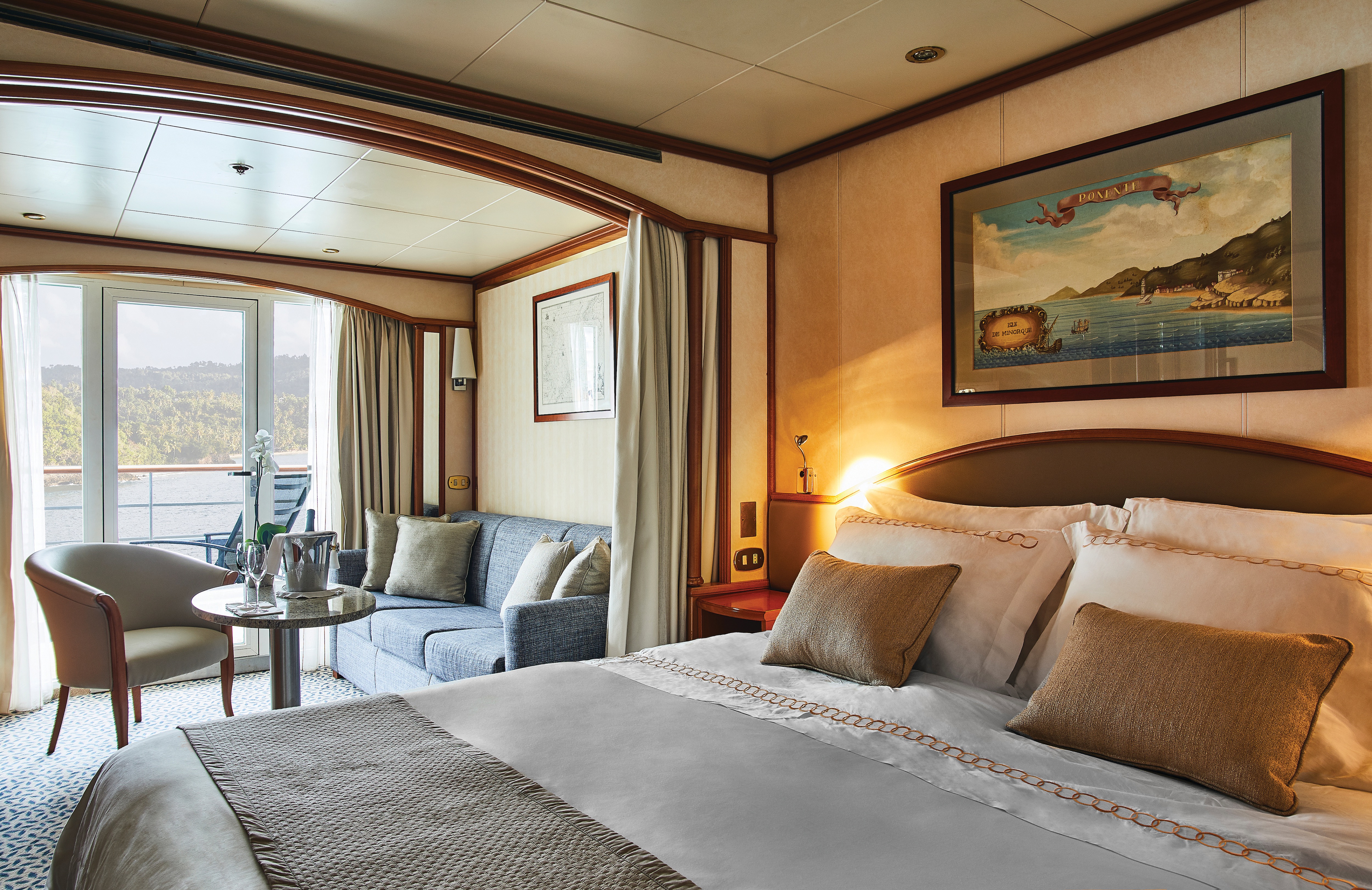
Deluxe Veranda Suite
Spacious and welcoming. A furnished private teak veranda. A preferred central location
The Deluxe Veranda Suite offers unbeatable views. A Silversea signature. Spacious and welcoming. Floor-to-ceiling glass doors open onto a furnished private teak veranda. Each spectacular sunset feels like it is yours alone. The Deluxe Veranda Suite offers a preferred central location with identical accommodation to a Veranda Suite. No top cruise line would be complete without such a luxury.
One bedroom: 27 sq.m. including veranda
Images and suite plans are intended as a general reference. Features, materials, finishes and layout maybe different than shown.
Please note that the 3rd guest will sleep on a comfortable sofa bed in the reception area of the suite.
Essentials
- Deck(s): 5, 6, 7
- Section: Mid-Ship
Characteristics
- Veranda
- Sitting area
- Standard vanity
- Walk-in shower
- Walk-in wardrobe with personal safe
Furniture
- Queen size bed
- Writing desk
- Luxury bed mattresses
Media & Communication
- Unlimited Standard Wi-Fi
- 1 large flat screen TV with Interactive Media Library
- Direct dial telephone
- Wall mounted USB-C mobile device chargers
- Dual voltage 110/220 outlets
Onboard Services
- Butler service
- Champagne on arrival
Amenities
- Pillow menu
- Refrigerator and bar setup stocked with your preferences
- Plush bathrobe
- Luxury bath amenities
- Umbrella
- Hair Dryer
- Slippers
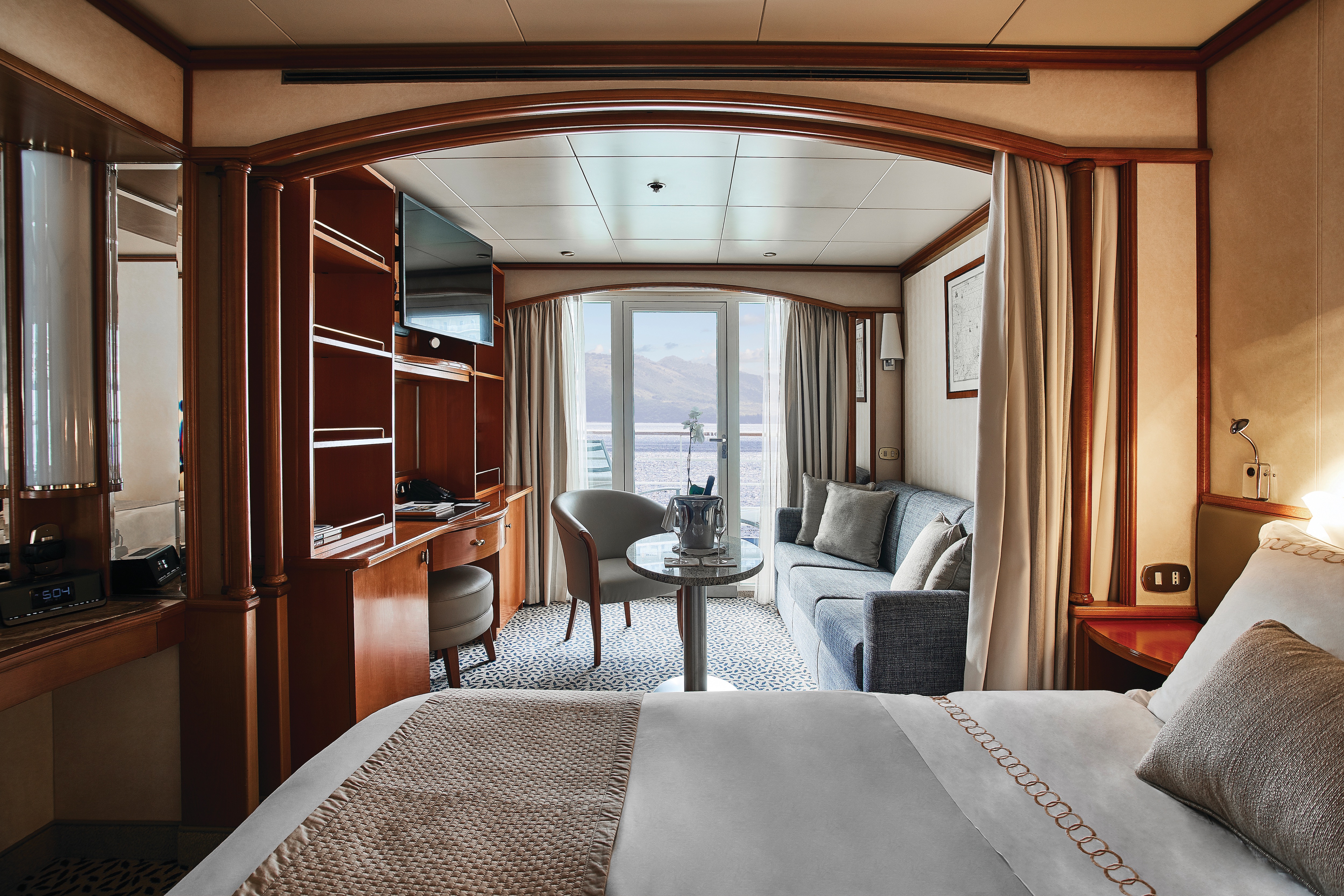
Classic Veranda Suite
Classic Veranda Suite rooms are spacious with beautiful sunset views aboard Silver Wind, making Silversea a top cruise line.
A Silversea signature, the Classic Veranda Suite is spacious and welcoming. Veranda suites offer floor-to-ceiling glass doors which open onto a furnished private teak veranda. Each spectacular sunset feels like it is yours alone. Some Classic Veranda Suites accommodate three guests. A must for the world’s best cruise line.
One bedroom: 27 sq.m. including veranda
Images and suite plans are intended as a general reference. Features, materials, finishes and layout maybe different than shown.
Please note that the 3rd guest will sleep on a comfortable sofa bed in the reception area of the suite.
Essentials
- Deck(s): 5, 6, 7
- Section: Forward
Characteristics
- Veranda
- Sitting area
- Standard vanity
- Walk-in shower
- Walk-in wardrobe with personal safe
Furniture
- Queen size bed
- Writing desk
- Luxury bed mattresses
Media & Communication
- Unlimited Standard Wi-Fi
- 1 large flat screen TV with Interactive Media Library
- Direct dial telephone
- Wall mounted USB-C mobile device chargers
- Dual voltage 110/220 outlets
Onboard Services
- Butler service
- Champagne on arrival
Amenities
- Pillow menu
- Refrigerator and bar setup stocked with your preferences
- Plush bathrobe
- Luxury bath amenities
- Umbrella
- Hair Dryer
- Slippers
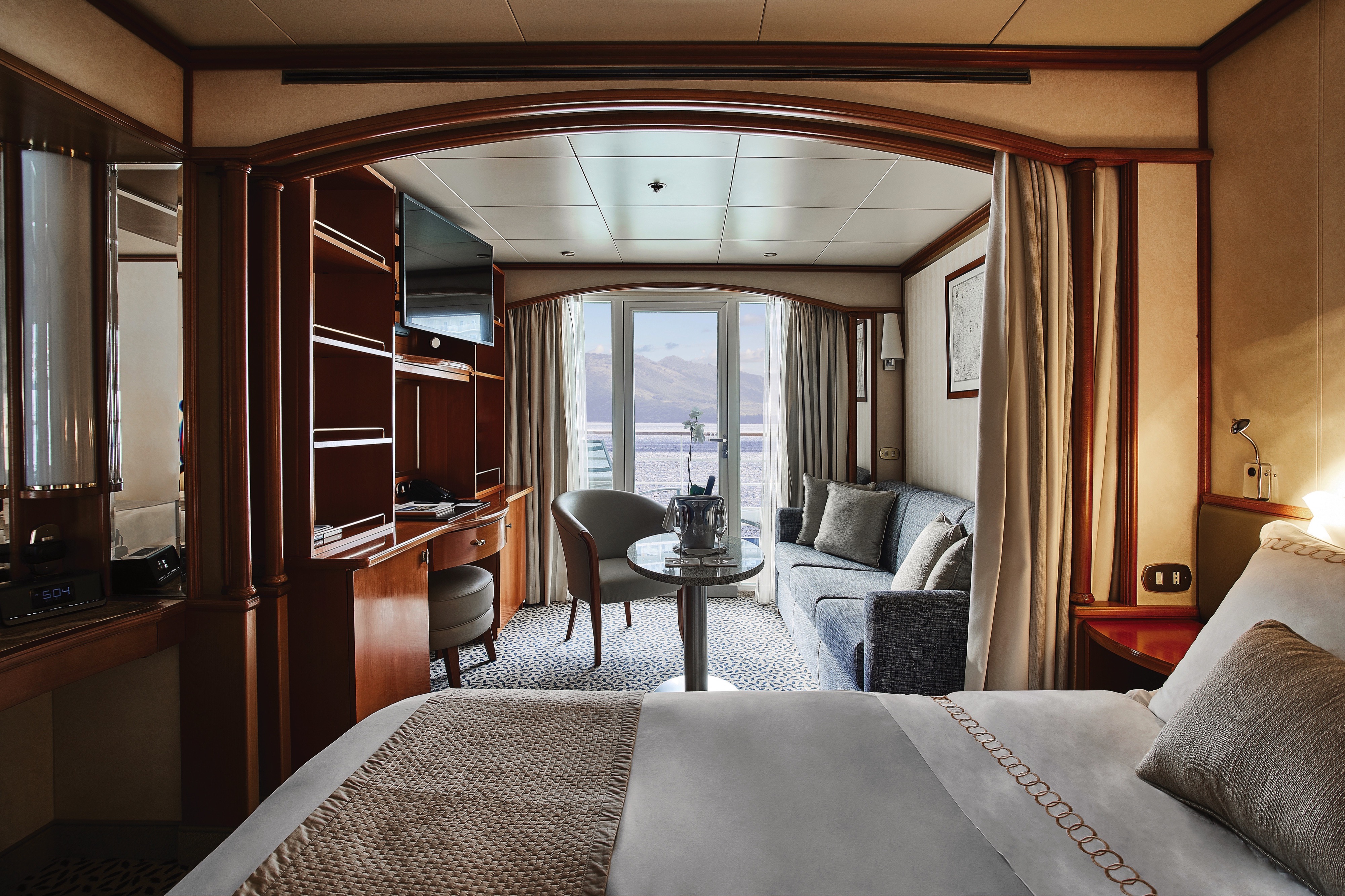
Vista Suite
A quiet sanctuary to escape to on your cruise. The seating area has plenty of room to relax. Large picture windows frame panoramic ocean views. The perfect backdrop for breakfast in bed.
One bedroom: 22 sq.m.
Suite 738: 325 sq.ft. / 30 sq.m.
Wheelchair accessible suites: 445 and 447
Images and suite plans are intended as a general reference. Features, materials, finishes and layout maybe different than shown.
Please note that the 3rd guest will sleep on a comfortable sofa bed in the reception area of the suite.
Essentials
- Deck(s): 4, 7
- Section: Aft, Forward
Characteristics
- Window
- Sitting area
- Standard vanity
- Walk-in shower
- Walk-in wardrobe with personal safe
Furniture
- Queen size bed
- Writing desk
- Luxury bed mattresses
Media & Communication
- Unlimited Standard Wi-Fi
- 1 large flat screen TV with Interactive Media Library
- Direct dial telephone
- Wall mounted USB-C mobile device chargers
- Dual voltage 110/220 outlets
Onboard Services
- Butler service
- Champagne on arrival
Amenities
- Pillow menu
- Refrigerator and bar setup stocked with your preferences
- Plush bathrobe
- Luxury bath amenities
- Umbrella
- Hair Dryer
- Slippers
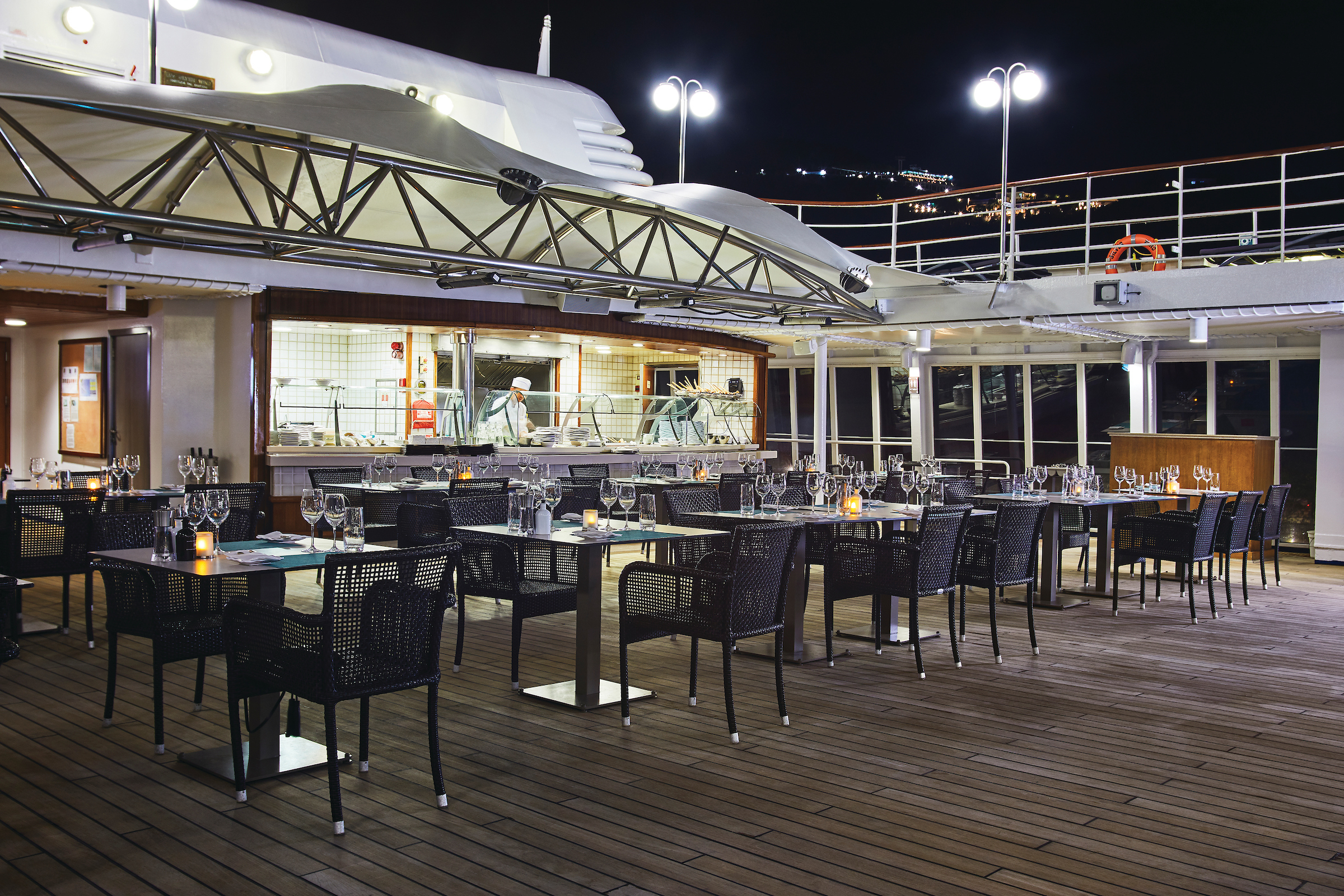
The Grill
Soft breezes and ocean views beckon at the Grill, especially as the sun goes down when cruise guests gather for cocktails at the outdoor bar and talk about the day’s events.
Silversea’s much-loved casual dining restaurant serves a delectable range of burgers and salads by day and turns into our famous Hot Rocks table BBQ concept by night. The Grill is quite simply the best place to eat between sea and sky. If you like flavoursome meals cooked to perfection, a casual, laid-back atmosphere, and OMG views, then The Grill is the answer to your prayers.
Dress code: Casual
Casual wear consists of pants, blouses or casual dresses for women; open-neck shirts and slacks for men are appropriate.
Images and suite plans are intended as a general reference. Features, materials, finishes and layout may be different than shown.
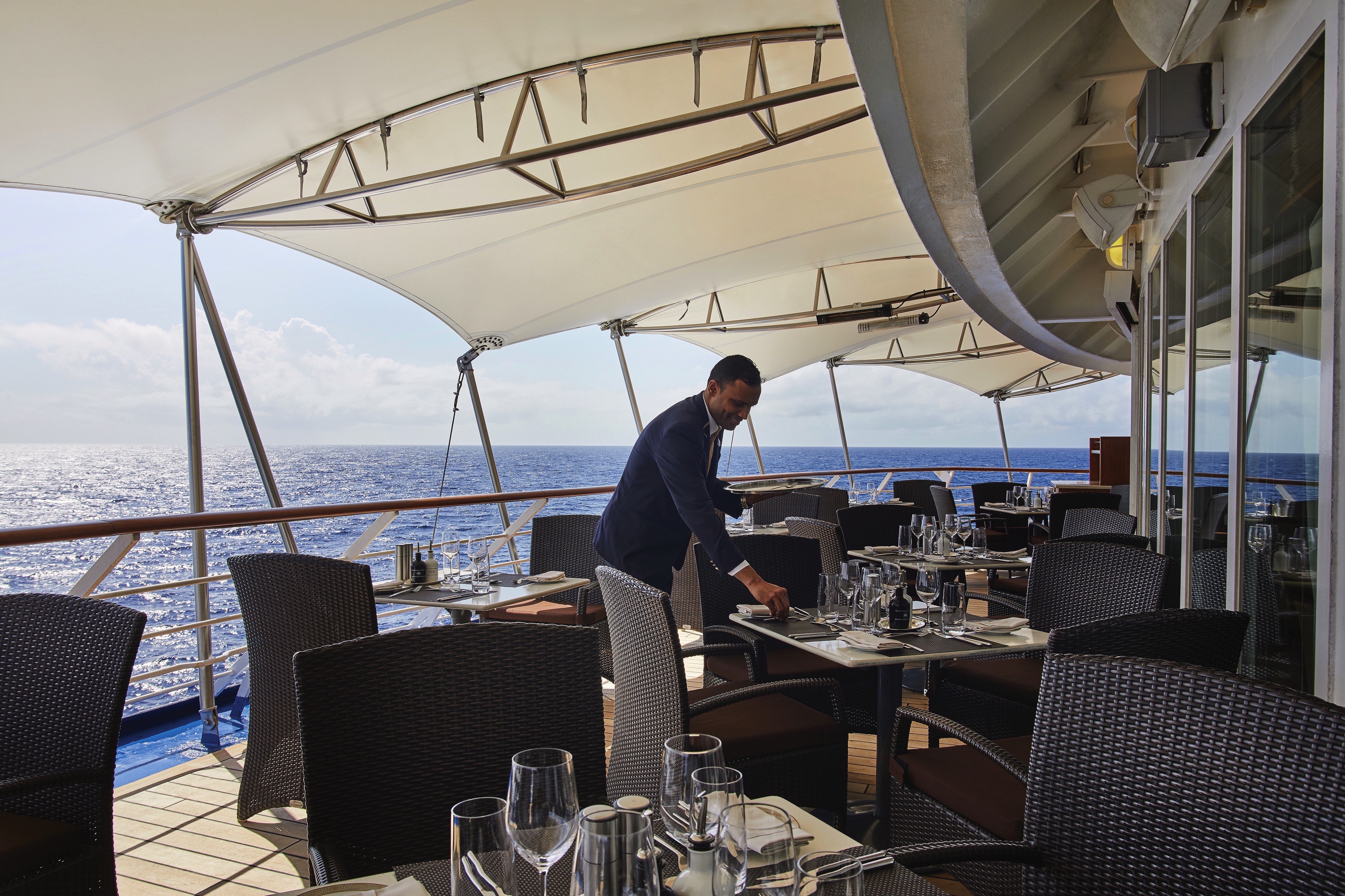
La Terrazza
Authentic Italian recipes and the freshest, sustainable ingredients come together in this restaurant at sea.
On board this luxury cruise ship, a divine selection of Italy’s best cuisine is served à la carte in La Terrazza. Authentic recipes and the freshest ingredients come together with flair and passion—a flavorful expression of Silversea’s distinctive Italian heritage. La Terrazza uses buffalo mozzarella from Naples, organic balsamic vinegar and olive oil from Umbria, and air-dried ham from Parma. The Emilia-Romagna region also produces Silversea’s 24-month aged Parmigiano Reggiano, while the pasta is made fresh daily on board the Silver Wind. La Terrazza is open for casual, buffet-style breakfast and lunch with indoor or alfresco dining on the outdoor terrace of this luxury cruise ship. During the evening, La Terrazza transforms into an à la carte traditional Italian restaurant.
Open-seating for breakfast and lunch.
Reservations recommended for dinner.
Images and suite plans are intended as a general reference. Features, materials, finishes and layout may be different than shown.

The Restaurant
Enjoy Continental and regional specialities, as well as sweeping ocean views in our main dining room.
Sparkling with silver, crystal and candlelight, this luxury cruise ship’s main dining room serves contemporary, international cuisine with the sophisticated elegance and impeccable service you might expect as part of your prestige travel. Menus feature regional specialties unique to the voyage destination. For example, roasted Chilean sea bass while cruising the Chilean fjords and Indian chicken korma en route to Mumbai. The Restaurant on board this luxury cruise ship offers open-seating dining, which means there are no assigned times and no assigned tables. You are free to dine when, where and with whom you please.
Images and suite plans are intended as a general reference. Features, materials, finishes and layout may be different than shown.
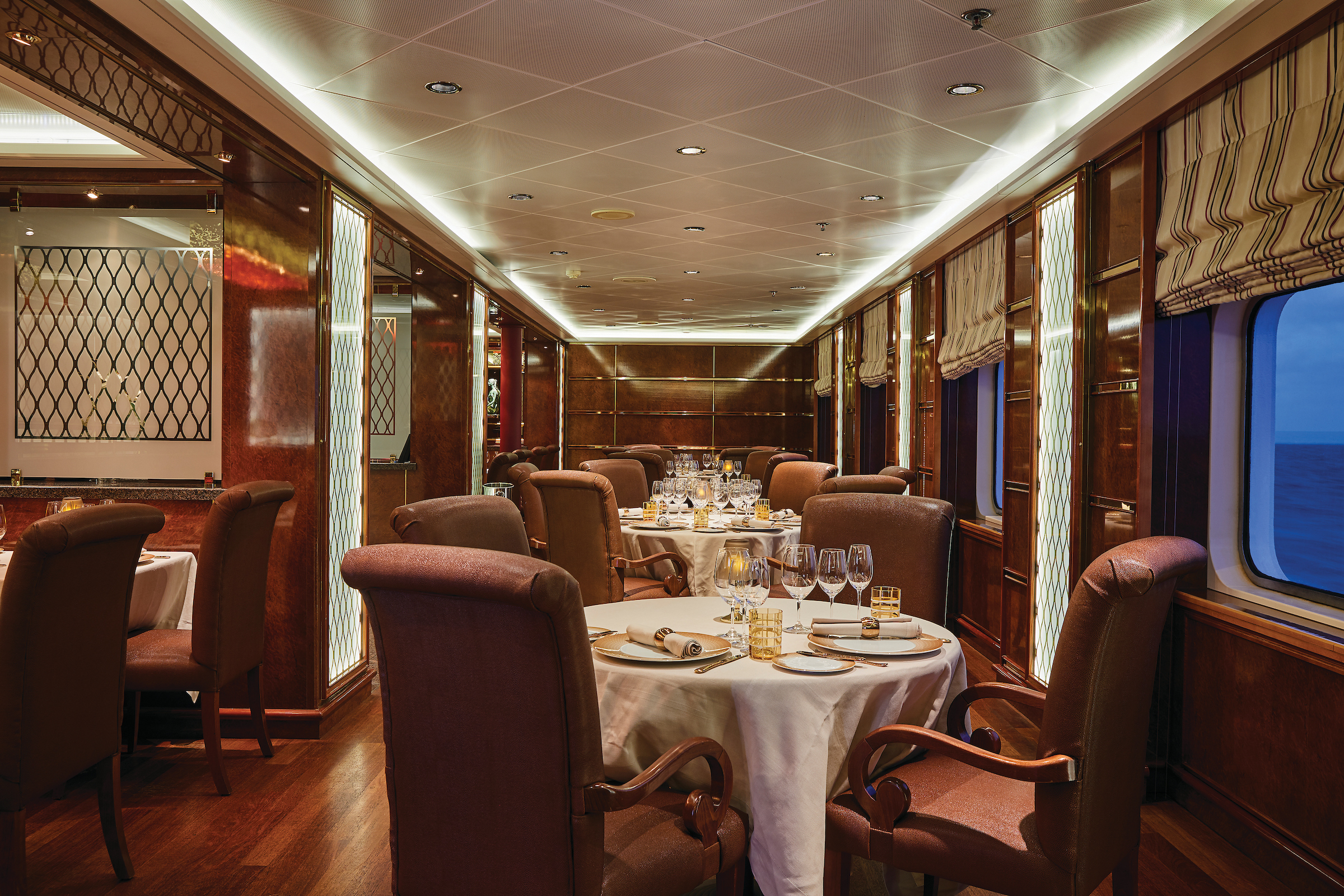
La Dame
La Dame features a menu of seasonally inspired dishes prepared with the freshest locally sourced ingredients.
La Dame can be found aboard Silversea luxury cruise ships. Indulge in an evening where fine wines are complemented by a special set menu of regionally-inspired dishes in an intimate, elegant setting. An extraordinary six-course experience celebrating the world’s most distinguished wine regions aboard your luxury cruise ship.
Per guest reservation fee of US$60. Please visit My Silversea to make your reservations.
Reservations required for dinner.
Images and suite plans are intended as a general reference. Features, materials, finishes and layout may be different than shown.
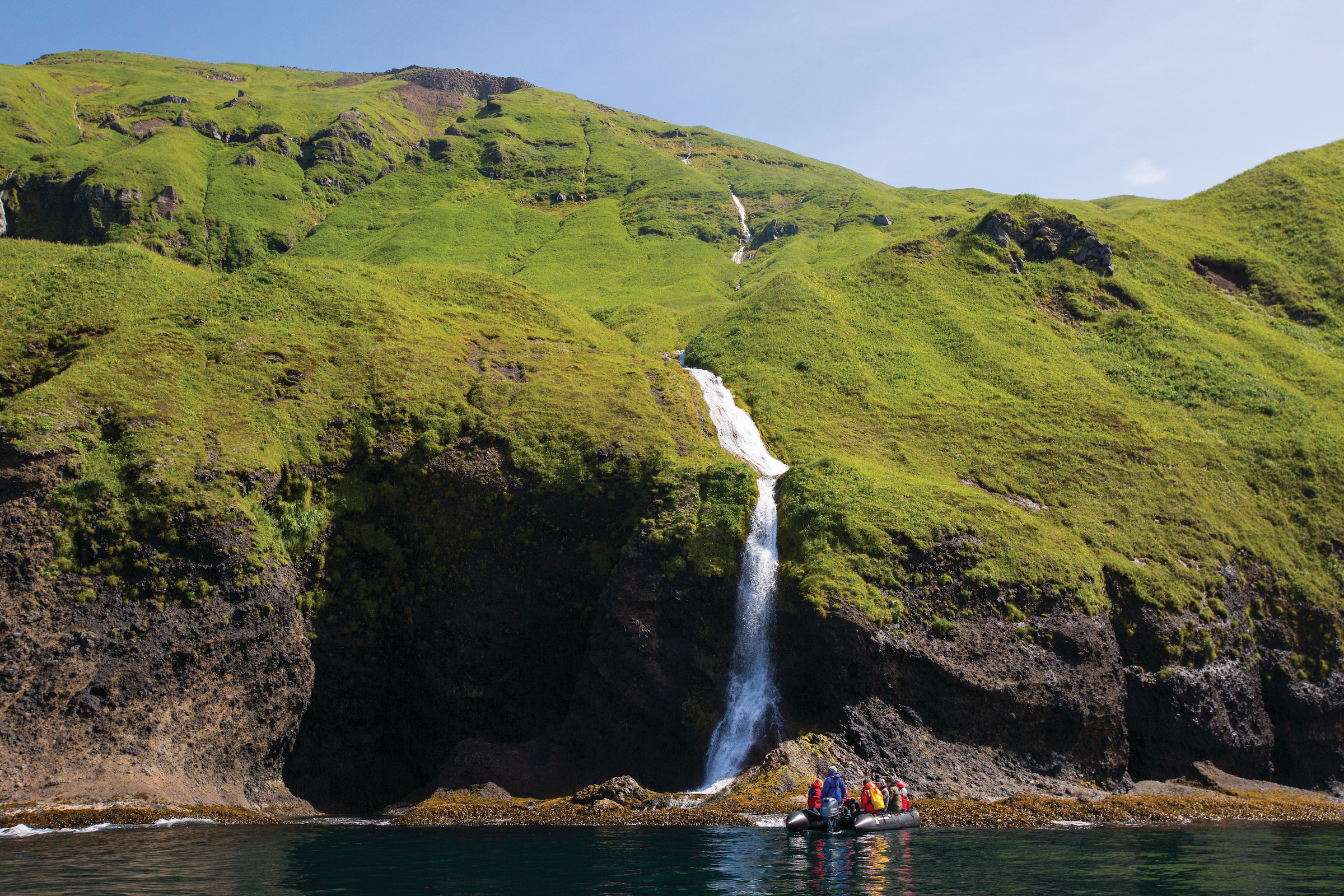
Shore Excursions
Silversea’s experienced Shore Concierge team are happy to assist, ensuring your shore- side experience is nothing less than a memory that lasts forever. Their knowledge and understanding of ports will truly add to your enjoyment and experience. Detailing history, local flavour, culture, regional customs, shopping tips and much more, they will make sure you get the best of your destination, wherever you are in the world.
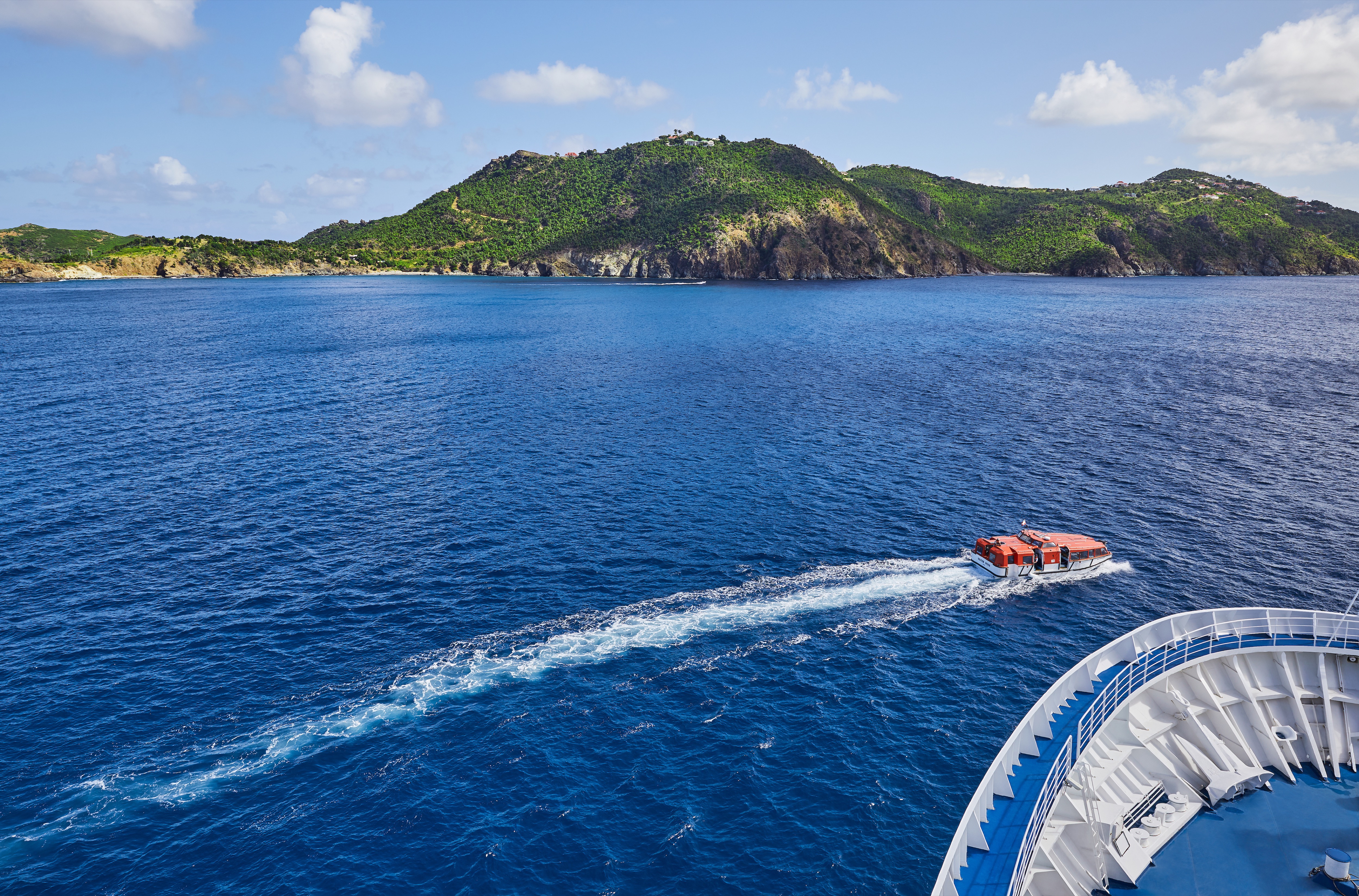
Mid-Voyage Adventures
Multiple days at sea mean plenty of R & R for some, but others prefer to drink in all there is to offer on land. Our Mid-Cruise Land Adventures allow you to take full advantage of your time with us without missing a single thing! These short escapades offer an array of adventures, break up your sea days and allow for deeper exploration beyond the coast.
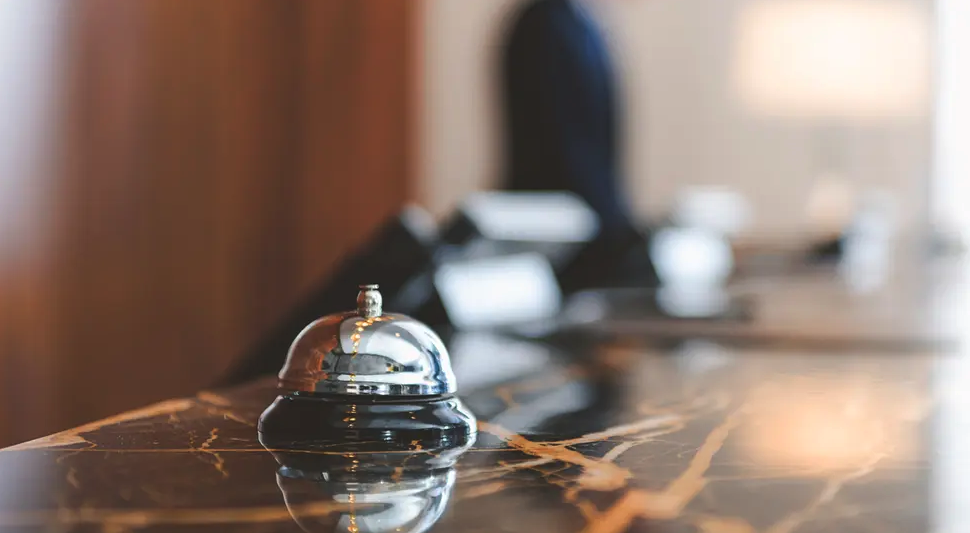
Silver Shore Concierge
Let Silversea customise a special event or excursion exclusively for you. Expert Shore Excursion professionals are available to assist with all your shorex questions. Make an appointment and gain insider access to knowledgeable suggestions, personalised planning and hassle-free coordination of all private, independent touring, including area highlights, flightseeing, water sports, and much more. Take advantage of this service either in advance of your voyage by email at shoreconcierge@silversea.com or on board by visiting the Silvershore® Concierge desk. Have the Silver Shore Concierge create your tailor-made tour, or be whisked away by private car for a day — the pace and agenda are up to you.

Boutique
There is a wealth of luxury shopping experiences aboard all Silversea ships, featuring the most distinctive and appealing brands from across the globe.
Exceptional shopping experiences do not end in the cosmopolitan cities we visit. Silversea’s striking new shipboard boutiques, reimagined and redesigned, are stunning modern design spaces befitting the finest creations from legendary designers. Carefully selected partners available in Silversea’s duty-free boutiques offer our guests a carefully curated selection of cutting-edge fashions, jewellery, accessories, fine perfumes, cosmetics and Silversea Logo collection all at duty-free prices.
Images and suite plans are intended as a general reference. Features, materials, finishes and layout may be different than shown.
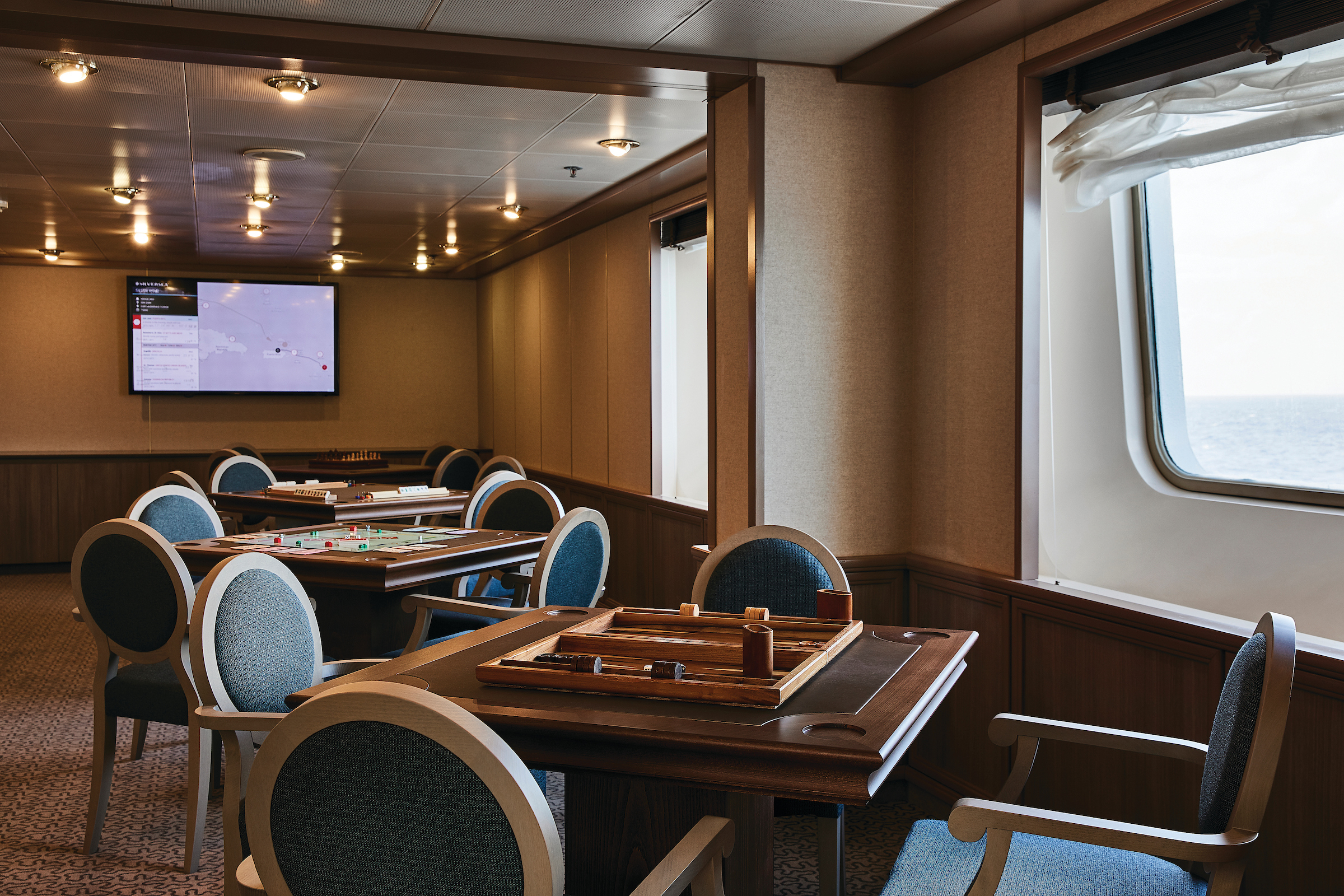
Conference Room
The Card Room on board this luxury cruise ship is where Bridge games and tournaments take place most days. On days at sea, newcomers to the game can learn how to play. Should your group require a conference or meeting space, Silversea is pleased to provide a tailor-made experience. Audio-visual equipment is available and complimentary.
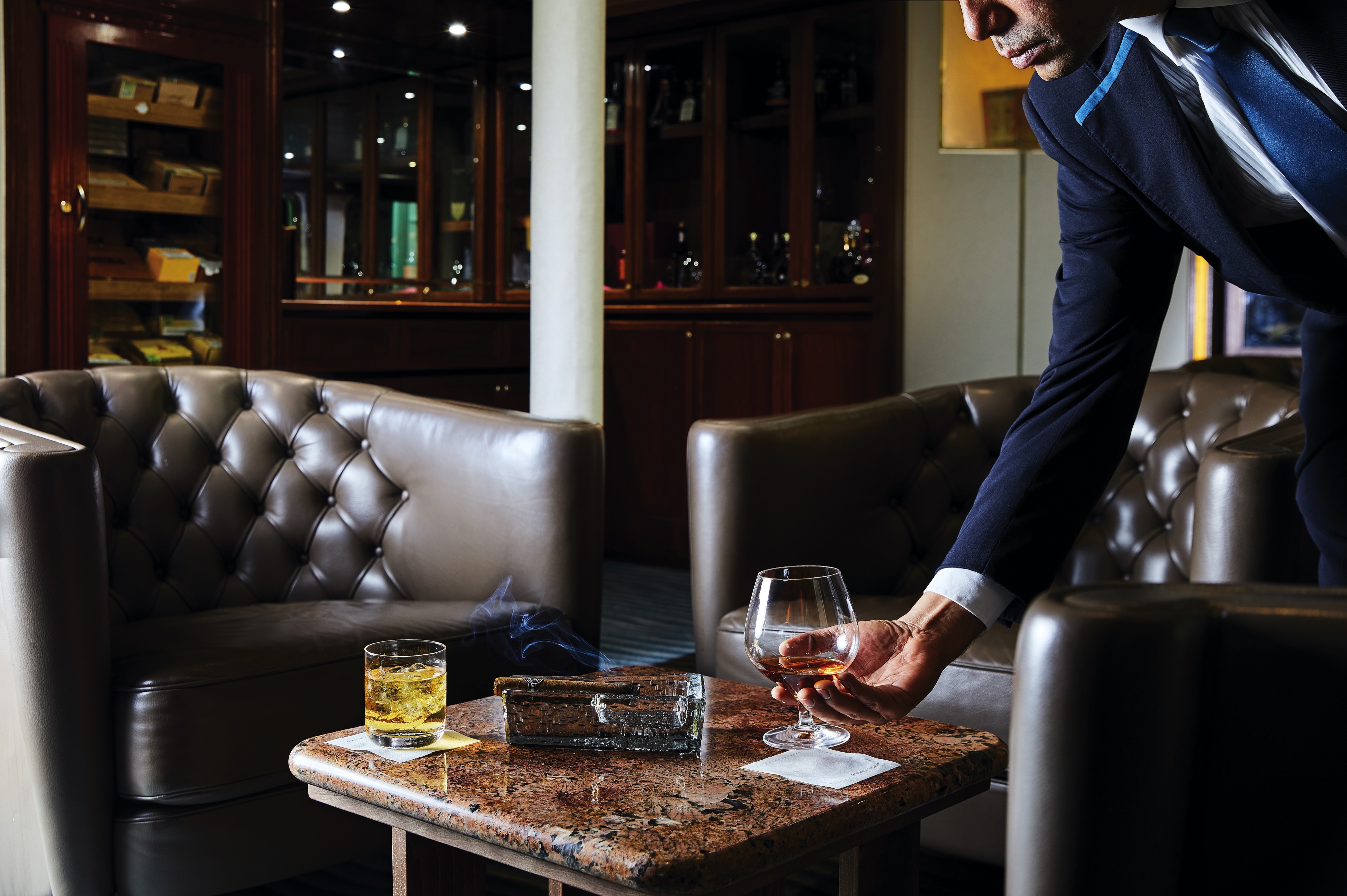
Connoisseur's Corner
If you appreciate good cognac or premium cigars, be sure to visit the Connoisseur’s Corner to see the ship’s exceptional selection.
The Connoisseur’s Corner on board the Silver Wind offers exceptional cognacs along with a premium selection of cigars for purchase to enjoy during your stay on the ship.
Images and suite plans are intended as a general reference. Features, materials, finishes and layout maybe different than shown.

Observation Library
The Observation Library boasts exceptional views overlooking the ocean as it stretches out below you while you enjoy your cruise.
Set on the highest level at the very top of the ship, this is a quiet space for reading and reflection while being dazzled by the undulating seascapes that are part of life on board.
Images and suite plans are intended as a general reference. Features, materials, finishes and layout may be different than shown.
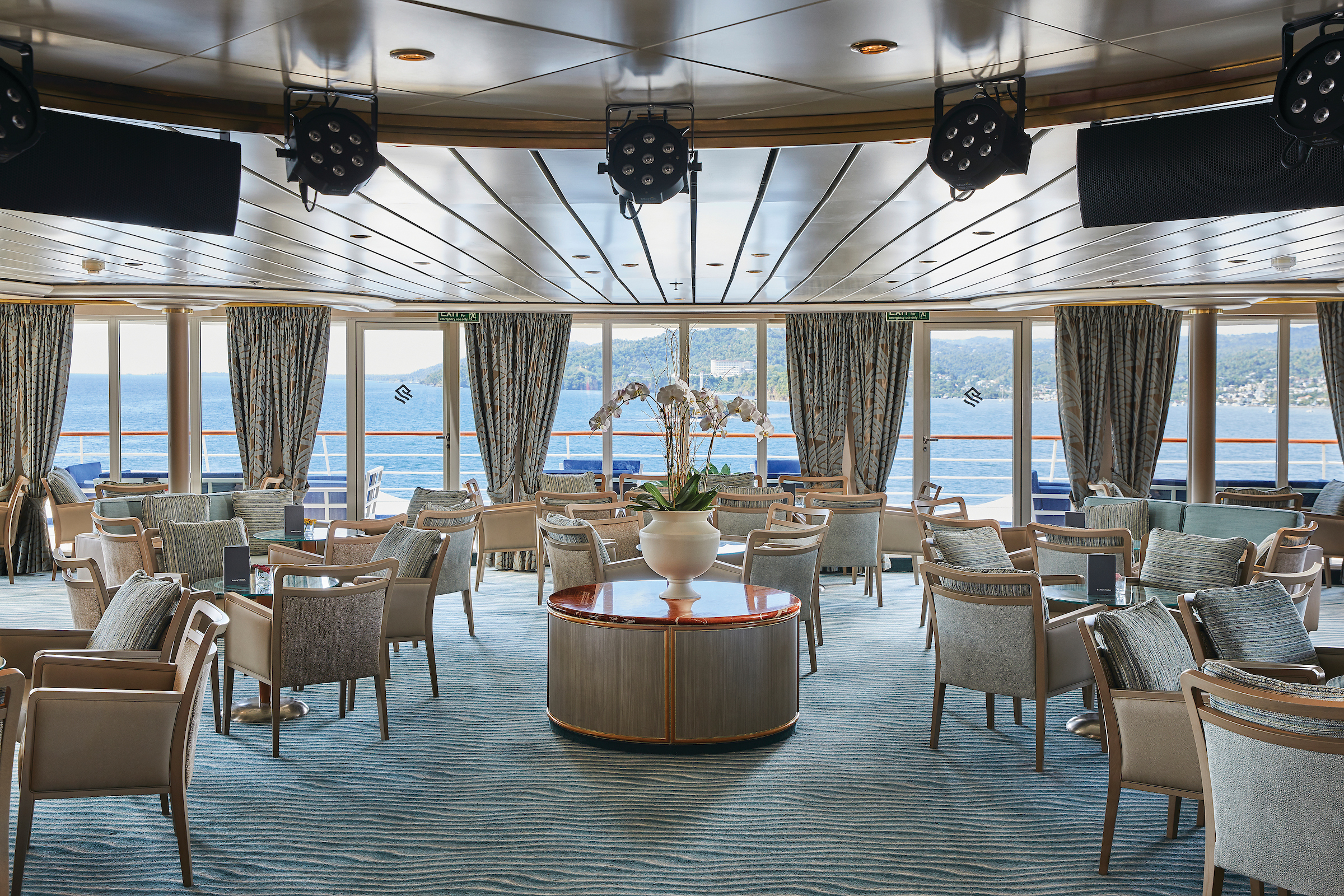
Panorama Lounge
Relax and unwind in the Panorama Lounge, a sophisticated yet amicable space offering beautiful ocean views as you enjoy your cruise.
The Silver Wind’s Panorama Lounge is specially designed to provide an uninterrupted view of the day’s destination from the comfort of the luxury cruise ship’s interior. This is an ideal place to unwind on your cruise, enjoy afternoon tea, listen to the pianist and watch the setting sun. The drinks are complimentary, and the music live and inviting. Enjoy dancing to a range of musical styles for every taste, from the classics to the latest club mixes.
Images and suite plans are intended as a general reference. Features, materials, finishes and layout may be different than shown.

The Show Lounge
Enjoy a broad spectrum of entertainment from full-scale production shows and classical soloists, to cultural entertainment and feature films.
Enjoy a bit of culture on your luxury cruise. Every seat in this multitiered venue features a clear view of the stage. Enjoy a broad spectrum of entertainment—from full-scale production shows and classical soloists, to cultural entertainment and feature films. Throughout your voyage, this luxury cruise ship’s The Show Lounge also presents port talks, enrichment lectures and a variety of special events.
Images and suite plans are intended as a general reference. Features, materials, finishes and layout may be different than shown.
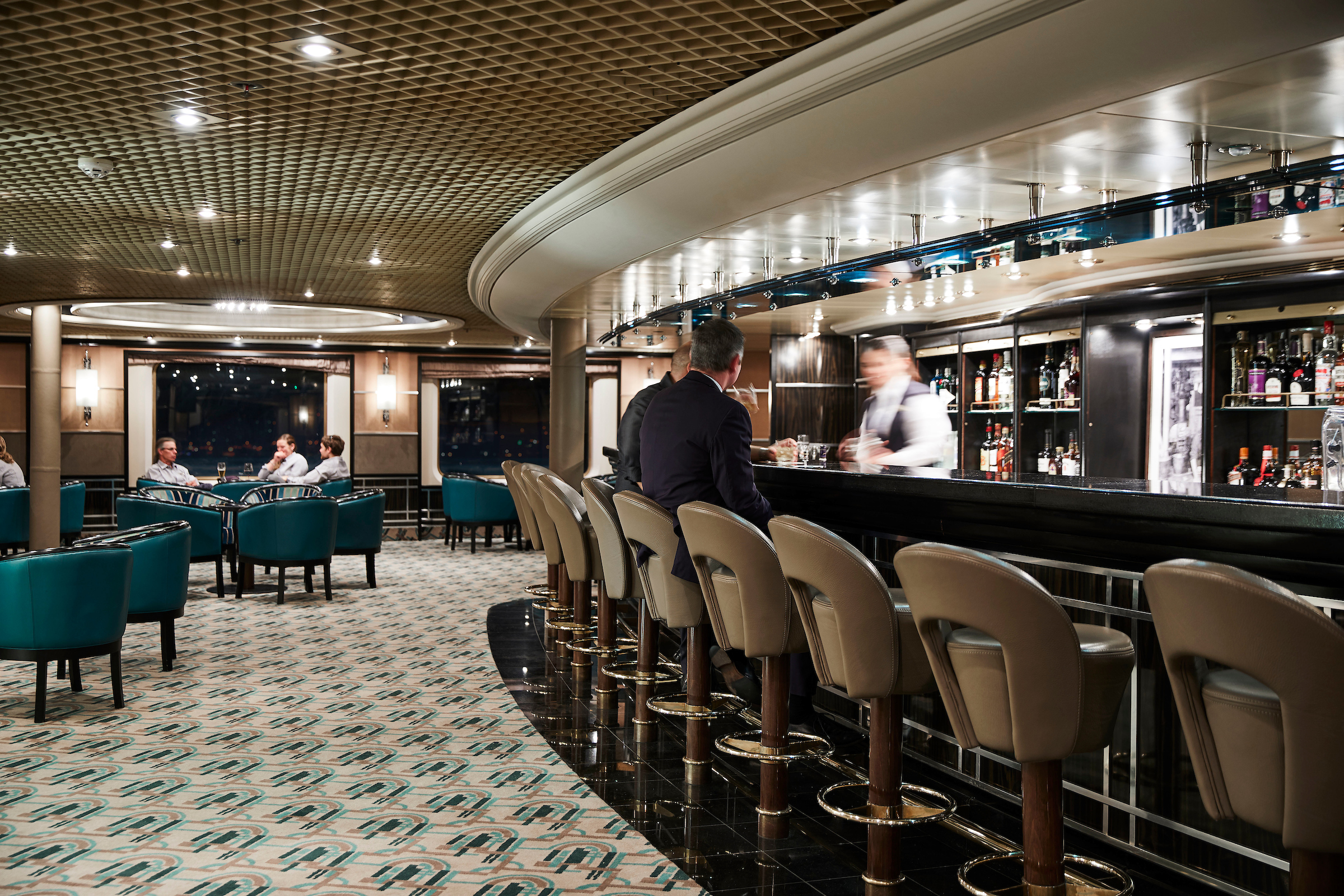
Dolce Vita
Dolce Vita is the gathering place for our savvy travellers of the world, a place where guests mingle and exchange stories and where new faces become lifelong friends.
Our main bar has been newly reimagined for Silver Dawn! Dolce Vita has of course kept her legendary charm, inspired cocktails, stylish décor and comfortable seating, but a central bar now means the warm ambience is better than ever! Oozing Italian glamour, Dolce Vita is a relaxed, refined bar with a nightly piano player playing all your favorite tunes. Perfect for a pre-dinner aperitif, or a post-dinner cocktail, Dolce Vita is truly the beating heart of social life on board.
Images and suite plans are intended as a general reference. Features, materials, finishes and layout may be different than shown.

Reception
Be sure to visit the Reception area, where our experts can provide invaluable information to help you get the most out of your cruise.
The Silver Wind’s central lobby area welcomes guests to speak with a Guest Relations specialist should they have a question or require any help. Assistance is available 24 hours a day; they will be able to help with any aspect of your cruise. For guests wishing to make shoreside arrangements, the Silver Shore Concierge is available to assist with knowledgeable suggestions and the personalized coordination of all private, independent touring including sightseeing, water sports, golf and more. The Cruise Consultant can prove indispensable when planning your next Silversea voyage, or should you wish to extend your current voyage for a day, a week or a month. Like having your own personal onboard Silversea professional, the Cruise Consultant will help you select the perfect voyage, reserve your preferred suite and provide immediate confirmation.
Images and suite plans are intended as a general reference. Features, materials, finishes and layout may be different than shown.
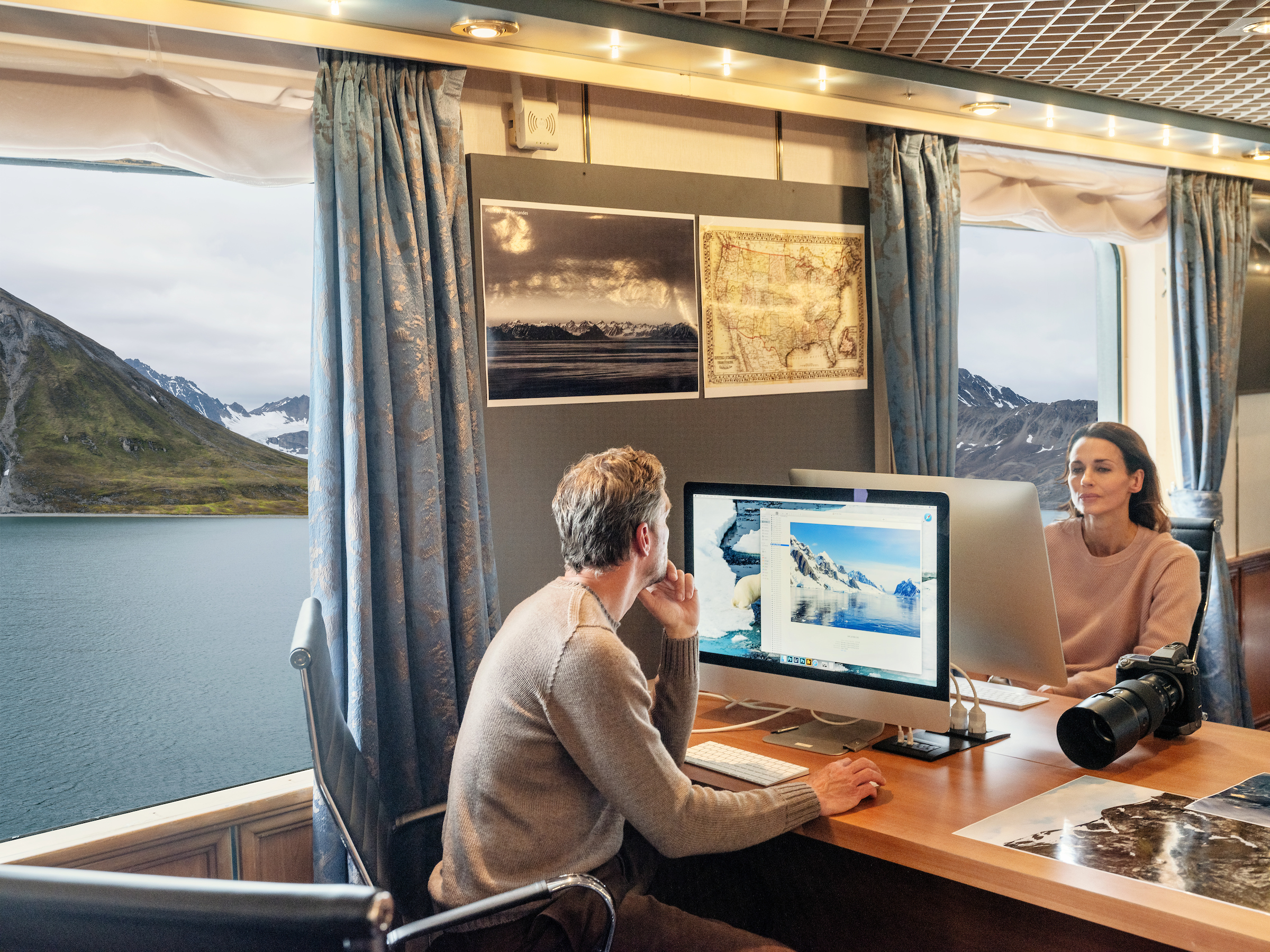
Photo Studio
The Photo Studio offers a professional space for budding photographers to retouch, print and display their work.
The Photo Studio offers a multitude of options to take your pictures from inside your camera to onto your walls. A vibrant, creatively inspiring space where you can not only master the art of digital photography with Masterclasses in editing, Adobe Lightroom and Photoshop, but also an editing suite where you can print images (including postcard, panorama and A2 prints). State-of-the-art equipment for both Mac and PC users, highly technological printers plus a dedicated photo manager to guide you through the many techniques to help you define yourself as a serious photographer. Even the smartphone photographer can become pro-level with specialized training on how to use your camera phone to its best possible advantage. Fees apply.
Images and suite plans are intended as a general reference. Features, materials, finishes and layout may be different than shown.

Fitness Centre
The Fitness Centre offers world-class equipment, classes, and personalised services.
The Fitness Center on board the Silver Wind luxury cruise ship is equipped with free weights, weight machines, state-of-the-art treadmills, elliptical trainers and recumbent and upright bikes. Classes in aerobics, yoga, Pilates and circuit training are led by the onboard fitness trainer and are always complimentary. Personal training, body composition analysis and specialty classes are available at the Fitness Center at an additional charge.
Images are intended as a general reference. Features, materials, finishes and layout may be different than shown.
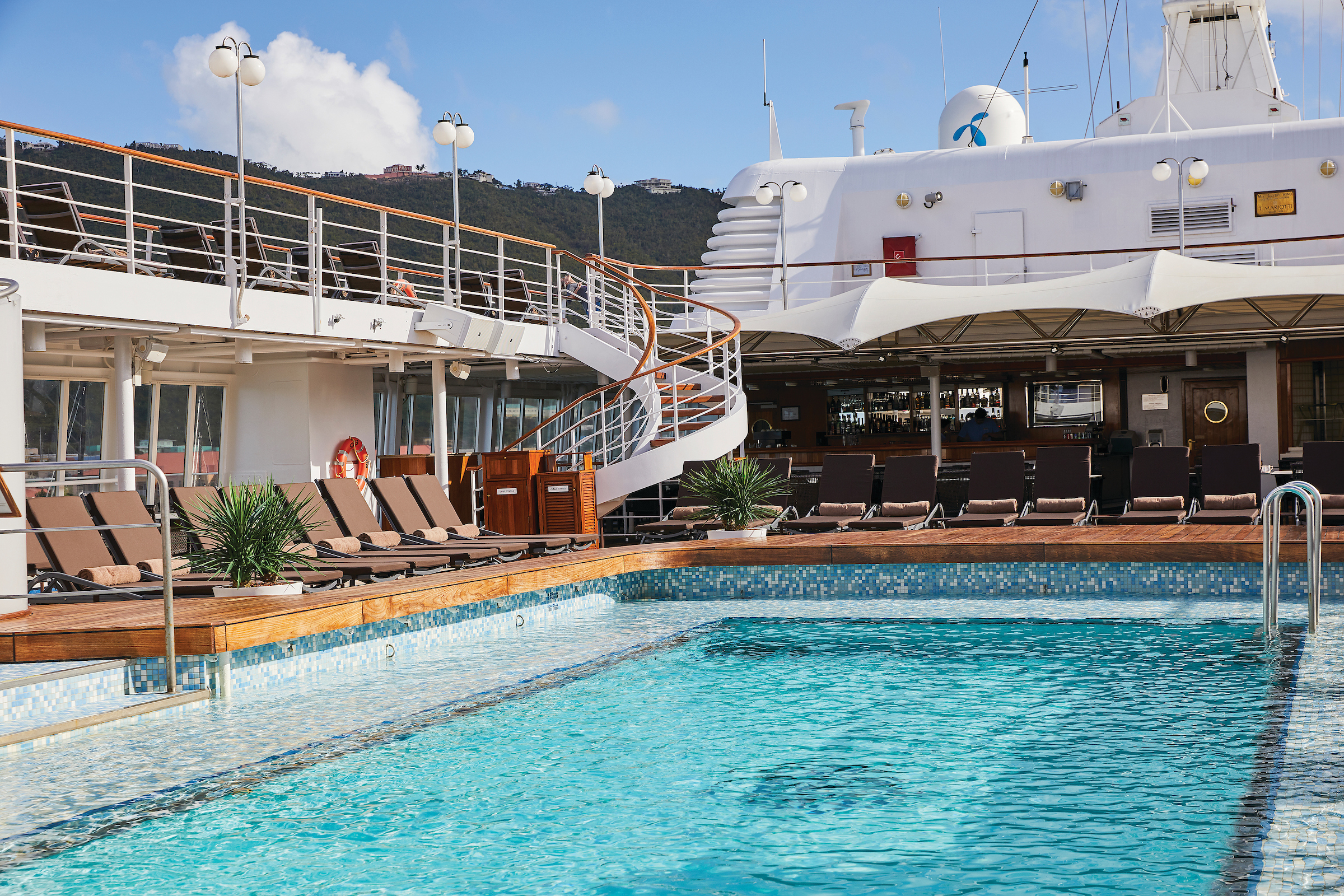
Pool Deck
Chaise lounges arranged in the sun or shade. Bubbling whirlpools. The pool water refreshing in warmer climates, heated for cooler weather. The attentive staff at the ready with an oversize towel as you emerge from the pool, with your favourite beverage at just the right moment. The luxury cruise ship of your dreams.
Images and suite plans are intended as a general reference. Features, materials, finishes and layout may be different than shown.
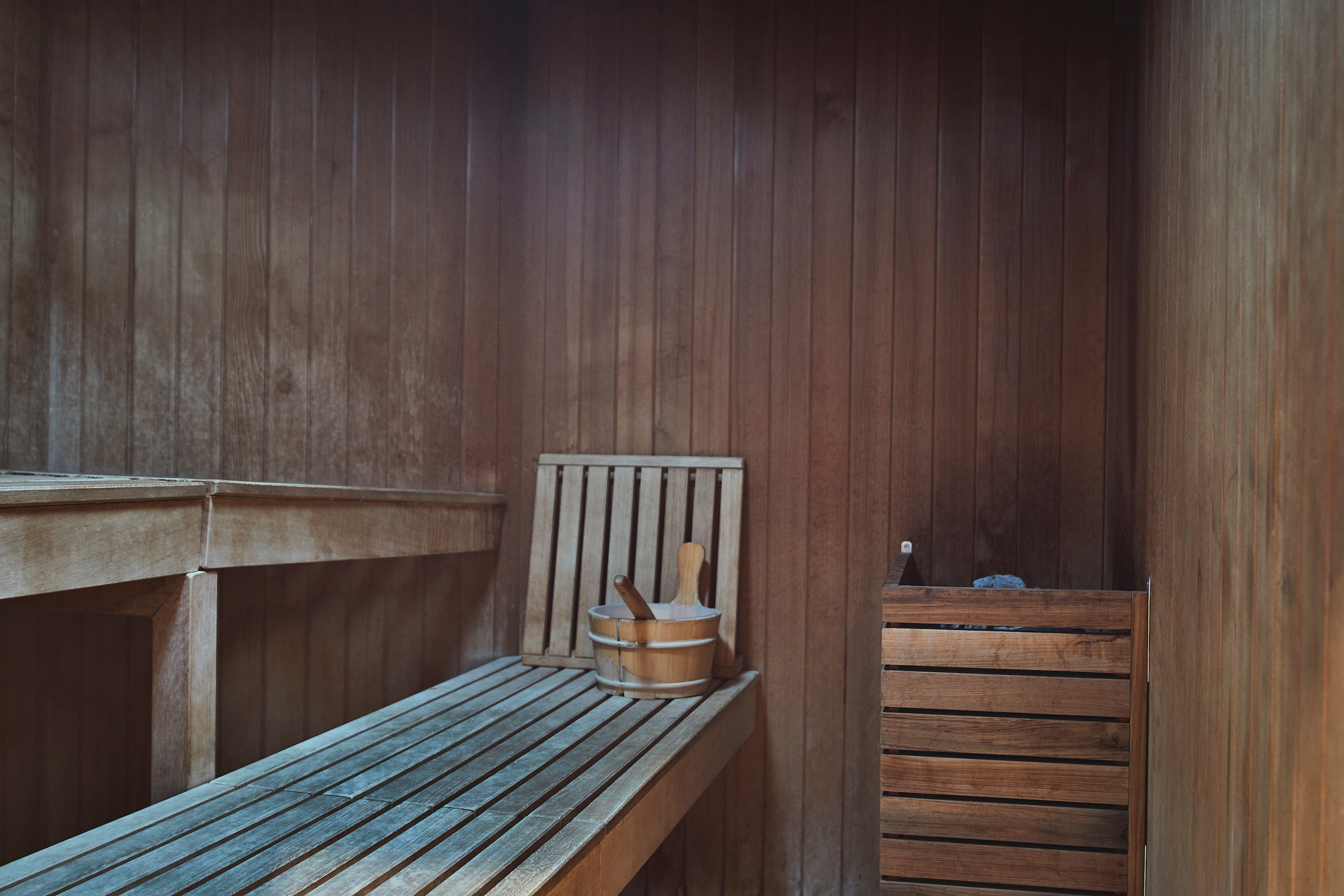
Zagara Beauty Spa
Come and indulge in a luxurious spa treatment. Facials, body wraps, massages – the spa is the perfect place to unwind.
Unwind on your luxury cruise with a visit to our soothing spa. Relax your body and mind in this soothing sanctuary on board this luxury cruise ship. Indulge in a wide range of invigorating therapies including facials, body wraps and massages. Appointments for spa services may be made on board the ship, or in advance via My Silversea. Men’s and women’s saunas and steam rooms are perfect for relaxing before your spa treatment or after your workout.
Images and suite plans are intended as a general reference. Features, materials, finishes and layout may be different than shown.

Zagara Beauty Salon
Maintain your fresh look throughout your luxury cruise at the Zagara Beauty Salon. Services are available for men and women.
A full range of beauty salon services, including hairstyling, manicures and pedicures, is available on board this luxury cruise ship for both men and women. Appointments for these chargeable services may be made on board the Silver Wind, or in advance via My Silversea.
Images and suite plans are intended as a general reference. Features, materials, finishes and layout may be different than shown.

Jogging Track
A jogging track is available for guests, running the entire outside edge of the deck.
Dress Code
We have created this guide to help answer any questions you might have before you embark on your voyage. You may be wondering what you should pack in your suitcase and what kind of clothing to wear while on board and ashore. Perhaps you are unsure of what type of dress code is expected in our restaurants on board and what to wear while exploring ashore. We have provided answers here while anticipating your questions and concerns about what to wear and we hope you find it helpful. If we have not covered a specific query or concern, simply contact your travel professional or our Reservations Department.
We look forward to welcoming you on board. Bon voyage!
ON BOARD
We have a dress code on board, so we have created this overview to help you prepare.
OCEAN-GOING
Silversea has an onboard dress code after 6:00 p.m.
During the day, casual wear, similar to five-star resort sportswear, is suitable for daytime activities. It is recommended to wear flat or low-heeled shoes for deck activities.
Evening wear falls into two categories:
- Elegant Casual: On casual evenings, ladies may opt for trousers, a blouse, a skirt or a casual dress, while gentlemen may wear an open-collar shirt and dress pants. A jacket is optional.
- Formal Optional: A more formal attire may be chosen, such as an evening gown or cocktail dress for ladies and a tuxedo, dinner jacket, or dark suit with a tie for gentlemen. Alternatively, adhering to an Elegant Casual dress code is welcomed, but a jacket is still required for gentlemen in all indoor spaces.
Regardless of the daily dress code:
- After 6:00 pm, indoor spaces prohibit jeans, shorts, hats, caps, sneakers or flip-flop type footwear.
- Casual wear is always suitable in outdoor venues.
- Gentlemen dining at La Dame restaurants are required to wear a jacket.
The number of formal evenings depends on the length of the voyage. A guideline for reference is below:
- On sailings of 7 days or less, Elegant Casual nights throughout.
- On sailings of 8–14 days, expect between one to two Formal Optional nights.
- On sailings of 15 days or more, expect two or more Formal Optional nights.
EXPEDITION
Onboard Silver Endeavour, Silver Cloud and Silver Wind
Silversea has an onboard dress code after 6:00 p.m.
During the day, casual wear, similar to five-star resort sportswear, is suitable for daytime activities. It is recommended to wear flat or low-heeled shoes for deck activities.
Evening wear falls into the following category:
- Elegant Casual: On casual evenings, ladies may opt for trousers, a blouse, a skirt or a casual dress, while gentlemen may wear an open-collar shirt and dress pants. A jacket is optional.
Regardless of the daily dress code:
- After 6:00 pm, indoor spaces prohibit jeans, shorts, hats, caps, sneakers or flip-flop type footwear.
- Casual wear is always suitable in outdoor venues.
- Gentlemen dining at La Dame restaurants are are not required to wear a jacket. The use of a jacket is optional.
On board Silver Origin
On board Silver Origin, shipboard attire is always casual.
During the day, casual wear, similar to five-star resort sportswear, is suitable for daytime activities. Shoes should be non-skid, flat or low-heeled for deck activities.
Evening attire is casual; open-neck shirts, trousers and sports outfits are appropriate, with the exception of jeans and shorts, which are not permitted in The Restaurant.
ASHORE
As you’ll be traveling to some of the most remote environments on board our expedition ships, our Expedition Experts curated a packing list for each destination to help you prepare the right gear and clothing items that are essential for your upcoming adventure.
For additional expedition gear please visit Ship to Shore Traveller
How many formal nights are on my cruise, and what type of clothing is worn?
Find out what to pack. All the details are shown in the General Information section. For Silversea Expeditions guests, casual resort wear is appropriate at all times when on board, with the exception of two evenings when formal attire is required. For men, this means a jacket, tie optional.
Does Silversea offer tuxedo rental service?
No, however, the onboard boutique has a limited selection of formal wear attire for purchase.
Smoking Policy
At Silversea, the comfort, enjoyment and safety of all guests is paramount. To ensure a pleasant and safe environment, smoking is prohibited in most public areas, guest suites or suite balconies. However, cigarette, e-cigarette, cigar, pipe and vaporiser smoking is permitted in the Connoisseur’s Corner both indoors and outdoors (where applicable). In addition, cigarette, e-cigarette and vaporiser smoking is permitted in specifically designated outside areas and tables:
- Silver Nova, Silver Ray: Dusk Bar (port side);
- Silver Muse, Silver Spirit: Panorama Lounge (port side) and Pool Grill (port side);
- Silver Moon, Silver Dawn: Panorama Lounge (starboard side) and Pool Grill (port side);
- Silver Shadow, Silver Whisper: Panorama Lounge (starboard side) and Pool Grill (starboard side);
- Silver Cloud, Silver Wind: Panorama Lounge (port side) and Pool Grill (port side);
- Silver Origin: on open deck 4 aft;
Silversea kindly requests that all guests observe the non-smoking areas.
Disabled Facilities
Wheelchair guests must bring their own collapsible wheelchair. Please note that not all shore excursions are suitable for guests with impaired mobility. Silversea strongly recommends wheelchair guests travel with someone who is able to assist them both ashore and at sea as Silversea may be unable to offer special assistance. Please note that wheel-on and/or wheel-off access may not be available at some ports-of-call. Silversea reserves the right to deny boarding to any guest who failed to notify Silversea of such requirement at the time of booking.
Silversea welcomes guests with mobility needs and offers various accessibility features onboard. However, due to the nature of cruising, some destinations and excursions may present challenges. Below is a guide to help guests plan their journey.
BEFORE BOOKING
Do guests need to notify Silversea in advance about mobility needs?
Yes, guests should inform Silversea of any special assistance or mobility equipment requirements before sailing. This can be done via My Silversea under Guest Information / Special Request, or by contacting specialservices@silversea.com.
Does Silversea provide wheelchairs?
Yes, each vessel has wheelchairs available at the reception for temporary use, such as embarkation and disembarkation. Guests who require a wheelchair for the entire cruise should bring their own.
Can guests bring their own mobility equipment?
Yes, personal wheelchairs, scooters, and other mobility aids are allowed. However, guests staying in standard (non-ADA) suites should note that electric scooters may not fit through the doors.
Therefore, guests traveling with a wheelchair, scooter, or ECV are always highly suggested to book a wheelchair-accessible suite with a wider entrance door and an appropriate path of travel inside the room and accommodate the equipment. Regular Suites have a narrower entrance door and may not have the necessary interior space to accommodate wheelchairs and scooters.
What features do wheelchair-accessible suites offer?
Silversea ships offer specially designed suites for guests who require mobility assistance. These suites are equipped with wider entrance doors and appropriate paths of travel to accommodate wheelchairs, scooters, and other mobility equipment. All areas within these suites are reachable without the need for additional ramps, except for Silver Suites onboard Silver Moon and Silver Dawn and Classic Veranda onboard Silver Endeavour. In these suites Silversea offer ramp to go outside the balcony. The vessels also have wheelchairs available at the reception for guest use.
Where to find the information regarding the disabled access suites?
This information is visible under the Suite tab by suite category.
Also, can be found on the deck plan after clicking on the “View Deck Plan” tab on the ship page. The disabled access suites are indicated with the universal accessibility icon.
EMBARKATION & DISEMBARKATION
How do guests get on and off the ship with mobility equipment?
Silversea vessels have procedures in place to assist guests with mobility equipment during embarkation and disembarkation. When the gangway is flat, guests can drive their wheelchair off the ship. However, if the gangway involves stairs, our staff will provide assistance. The Safety Officer or Bridge must be informed whenever a wheelchair is involved in disembarkation or boarding, and our crew members are available to assist guests in need.
Is assistance available for boarding?
Yes, but guests who require full-time assistance should travel with a companion, as Silversea does not provide dedicated personal caregivers. Butlers can assist with getting to the gangway or dining venues but do not provide continuous mobility assistance.
ONBOARD
Silversea’s ships are designed for accessibility, featuring:
- Wide gangways to accommodate most wheelchairs and scooters
- Accessible public restrooms
- Wheelchair seating in dining venues, bars, and the Venetian Lounge
- Braille/tactile signage for visually impaired guests in elevators, stateroom numbers, and staircases
How does Silversea assist disabled guests in their suites?
Silversea butler can provide reasonable assistance to guest getting to and from the gangway, and to and from a restaurant, however Silversea does not offer full-time wheelchair service and/or staff fully dedicated to providing Guests with wheelchair assistance. Guests traveling on their own wheelchair should be assisted only when requested and are recommended to travel with an able bodily companion.
GOING ASHORE
Are all ports wheelchair accessible?
Not all ports have wheelchair-friendly infrastructure. In some destinations, tender boats or on Silversea Expeditions Zodiacs are required for disembarkation, and wheelchairs or mobility scooters cannot be accommodated in these cases.
Can guests arrange private accessible transportation in port?
If available, private wheelchair-accessible vehicles can be arranged. In some ports, shuttle buses may be wheelchair accessible, but availability is not guaranteed.
Does Silversea offer wheelchair-accessible shore excursions?
Until now we have been offering dedicated “Wheelchair Accessible Excursions” in some areas of the world., These tours are operated by wheelchair accessible vehicles and include only wheelchair accessible venues. These tours are mainly offered in Europe and the US. If you have any questions or concerns regarding shore excursion suitability, please contact the Shore Concierge (shoreconcierge@silversea.com) before your voyage or visit the Shore Concierge desk for more detailed information once onboard.
Wheelchair accessible shore excursions are indicated on the website with the universal accessibility icon.
Are there alternatives for guests with limited mobility?
In almost every port, Silversea offers low-activity excursions specially designed for mobility challenged guests, who can negotiate the steps on and off the coaches.
Is there any destination that is not recommend to guests with disabilities?
The more exotic destinations, like Asia, South Africa and South America it is recommended to guest to book a private vehicle due to the lack of infrastructure, for example wheelchair accessible vehicles are very rare to find and museums, restaurants and popular attractions are not often completely accessible.
Does Silversea offer wheelchair-accessible transportation between the ship and visiting site?
If available in the port yes, however this is not often available.
How Silversea assist disabled guests during excursions?
If wheelchair accessible excursions are not available, it is recommended to guests to book a private vehicle where they can have a dedicated guide and driver who can give them full attention. On regular shore excursions, the guide must look after all guests and may not be able to fully assist disabled guests.
Special Dietary Requirements
If you have special dietary requirements, Silversea will make every attempt to accommodate your requests. Please advise Silversea of your needs on the Guest Information Form at least 75 days prior to sailing. Notification should be sent to specialservices@silversea.com
Medical Centre
Each Silversea ship is equipped with a Medical Centre, which is staffed by a doctor and nurse on 24-hour call when at sea. When docked, supplementary emergency care may also be obtained through local medical facilities. Guests may be charged for medical services and for medications used for their medical treatment. The Medical Centre is not intended or designed to provide on-going treatment of pre-existing conditions or for extended critical care, and Silversea is not responsible for the diagnosis, treatment or services furnished by shipboard medical personnel.
All guests are required to report in writing to Silversea at the time their reservation is made:
- Any physical or mental condition that may require medical or professional treatment or attention during the voyage
- Any condition that may render the guest unfit for travel, or that may require special care or assistance
- Any condition that may pose a risk or danger to the guest or anyone else on board the ship
- Any condition that may require oxygen for medical reasons
- Any intention or need to use a wheelchair aboard ship.
Age Restrictions
Applicable to all ships: Minors under the age of 18 must be accompanied, in the same or connecting suite, by a parent or other responsible adult over the age of 21 for the duration of the voyage and on all shore excursions and land programs. If the adult accompanying the minor is not their parent, a parental consent guardianship form must be signed by a parent or legal guardian and received by Silversea prior to sailing. Please contact our Special Services department at SpecialServices@Silversea.com for a Parental Consent Form. Silversea cannot accommodate infants under six months of age and reserves the right to limit the number of children under three years of age. Guests must be 21 years of age or older to consume alcohol. Silversea reserves the right to refuse to serve anyone who in its sole judgment may be under the influence of alcohol, or for any reason necessary to preserve the health and safety of guests and employees. Children under the age of eight years old are only permitted to participate in suitable Silver Shore Excursions / shuttle service if the vehicles are equipped with the correct safety harness and seating equipment. Child harnesses and secure seating cannot be guaranteed. Silversea reserves the right to refuse children under the age of eight years old on any tour on the basis of safety. Guests may use their own approved safety seat, booster seat or harness provided they are compatible with the local touring vehicle and can properly secure the child.
Laundry Service
Complete valet services, including laundry, pressing and wet cleaning, are available at an additional charge and may be arranged through your butler. Laundry service is complimentary on higher category suites (Premium Medallion, Medallion, Silver, Royal, Grand, Junior Grand, Signature, Master, Otium and Owner’s Suites) and for those Venetian Society members who have reached certain reward levels. click here to learn more. A self-service laundromat offers washing machines, dryers, irons and laundry supplies, allowing you to limit the amount of cruise luggage needed, especially for longer voyages.
Wi-FI & Internet
All Silversea ships are equipped to offer wireless (Wi-Fi) Internet access. You can use your own laptop to surf the Internet and check emails at Wi-Fi locations throughout the ship, or from the comfort and privacy of your suite. Computers, email and Internet access are also available on board at the Internet Café. However, it is important to understand that telecommunication services while at sea are via satellite and significantly different than high-speed connections on land back home. The signal travels in a similar manner to radio waves but at much greater distances. Therefore, onboard Internet access is not guaranteed at all times. Satellite communications are also affected by weather and the ship’s location. In particular, Internet service is extremely sporadic while in the Arctic. Guests aboard expedition cruises to/from Svalbard should be prepared to be out of communication for the duration of their time on board.
Onboard cell phone service enables you to make and receive phone calls, text messages and other select data services on your cell phone even when miles away from land. Your cell phone service provider will bill you for calls and/or messages, which may appear as roaming charges. Please note that cell phone service is sporadic at best while in the Arctic. Guests aboard voyages to/from Svalbard should be prepared to be out of communication for the duration of their time on board. Click here for more information on Silversea’s Cellular Phone service.
Will my devices work on board?
To be most successful, prepare your devices BEFORE leaving home:
- Learn how to turn ON and turn OFF both the Wi-Fi and network (mobile/cellular) connections on each of your devices.
- Contact your mobile/cellular service provider to confirm that a roaming agreement with Silversea Cruises has been established and to ask about rates. Learn how to enable your international roaming
- Set up an email account if you do not have one already.
- Be sure you know any usernames and passwords you may need.
- Switch your settings to the most basic choice that shows less graphics and loads faster.
- Make any software updates and turn off any automatic update settings for the duration of your cruise.
- Download any books, audiobooks, music, movies, games, apps, etc. that you may want during your cruise.
- Facebook users should bookmark and plan to use M.Facebook.com or Touch.Facebook.com instead as these have less graphics and load faster.
- Don’t forget to pack any power cords/battery packs, camera cables to transfer pictures, adapter cables and headphones you may need for each of your devices.
Will I be able to download videos and stream music?
Certain websites and services may be restricted due to limited bandwidth. Downloading videos, books and movies or using Skype are examples of high-bandwidth services that will be more frustrating than enjoyable and should be avoided. Plan to use the Internet only for emailing and web browsing.
How can someone contact me on the ship?
In the case of an emergency back home, friends and family should not call your cell phone. The Shore-to-Ship number provided in your Final Cruise Documents is the best way to reach you while aboard ship. Click here for more information on Dial A Ship service, an alternate option for contacting ships at sea, anywhere in the world.

Deck 9
- Fitness Centre
- Beauty Salon & Spa
- Observation Library
- Jogging Track

Deck 8
- Pool Deck
- Pool Bar
- The Grill
- Panorama Lounge
- Connoisseur’s Corner
- Whirlpools
- Medallion Suites

Deck 7
- La Terrazza
- Grand Suites
- Classic Veranda Suites
- Silver Suites
- Deluxe Veranda Suite
- Owners Suites
- Vista Suite
- Medallion Suite

Deck 6
- The Show Lounge
- Conference Room
- Reception
- Expedition Office
- Future Cruise Manager
- Lobby
- Shore Concierge
- Silver Suite
- Classic Veranda Suites
- Deluxe Veranda Suites
- Royal Suites

Deck 5
- Photo Studio
- Lobby
- Dolce Vita
- Boutique
- Silver Suite
- Classic Veranda Suites
- Deluxe Veranda Suites

Deck 4
- The Restaurant
- La Dame
- Launderette
- Vista Suites (x2 Accessible Suites)

Deck 3
- Changing Room
- Embarkation Deck
- Medical Centre
